#this is my firsthand view of how the past 20 years or so has gone hahah its aaaaall downhill
Note
Heya purge! I saw in one of your tags that you’d been consuming fic for around 20 years! That’s like my whole life. Mind telling us how things have changed? I’m sure places like ao3 have changed things a lot. I’m just really curious in fandom and fanfic culture! :3 x
Ao3 is a fucking godsend let me tell you. I won’t make a lot of the same points and stuff that fannish history folks have already documented (how it literally changed, and all the fic we’ve lost that isn’t backed up on floppy disk somewhere… I’d say we’ve lost an equivalent to the digital burning of alexandria honestly) but i can tell you my experience :3
I’ll stick it under a cut cuz i kind of rambled… but i had fun doing so ahahha xD sorry you unleashed the tiger from the cage xD
We all make jokes about ‘being there’ when stuff in fandom history happened, but i’ve been around since all the major purges (LOL my name is so fitting in retrospect ahahha). ff.net’s various purges (and the whole anne rice suing fanfic writers and shit… i never DID agree to their new terms of service haha), geocities sites going down, obviously the more recent shit too, but like I’ve been around even for the creations of certain, older fanfic sites too (one of the oldest slash forums for lord of the rings fics for example… I was there, Gandalf LOLOL!!… and now that i check the date on that i feel old as balls thanks anon xDDD and wow my one fic is still up there PFFFFT) but like, I come from an era where you took your floppy disk and copy/pasted shit from online (once it even loaded) for later reading, and also so you could find it again, because also before ff.net it was hard to find stuff. I’m pre-google ya’ll xD You dont UNDERSTAND the horrors of trying to find anything pre-google. Ya’ll have it so fucking good D:
There was never an abundance of content like there is today, and so you can bet your shit we were grateful as fuck for what was out there, let alone for someone with a decent command of writing and storytelling. Everyone commented on everything (once that was something even implemented… it was email lists before that, and comments sent in that way… i still have my e-mailed comments from fic readers haha), and it was (and still is, in my honest opinion because people entitled as FUCK now) one of the GREATEST faux paus you could do to be reading a fic (esp. multi-chaptered) and not comment. The indignity of not giving back a little (and it still is a little, which is why i get so damn fired up on this subject) for aaaaaaaall the words and story and everything you just read was a serious sin against fanfic writers. I still think its seriously fucked up not to comment (and again, i’ve mentioned that if you dont got the spoons, thats obviously different) but like, the entitlement that runs rampant today did not even exist back then. Yeah, you still had the assholes whose comment would literally consist only of “where’s the rest?” with ZERO actual thanks or input while expecting/thinking they deserve more (and THEN you could remove chapters or stories, cuz god giveth and damn does she taketh away xD), but it wasn’t nearly as prolific as it is today.
The commenting culture today and the backlash against writers wanting comments on their work in return for providing said free content makes me mad enough to wanna curb stomp some people. I’m a bartender, I don’t put up with shit HAHA xD But the entitlement especially now and people who act like writers are being uppity for wanting a small return on their craft are disgusting. Same type of entitlement as art thieves (we all know the type). We didn’t put up with that shit back then. People acting like little bitches wanting free stuff for literally nothing? We’d pull the whole fic. And the community would handle it and it usually turned into a teaching moment about how damn important it is to comment and just how much freaking control writers DO have over their media. We’d pull it from public view unless amends were made (whether that be a private note from someone entitled finally paying their fucking due with proper humility, or reaching a comment count when you had hundreds of people reading but not commenting). Damn i miss taking away fic xD We played hardball back then xD
That was the fucking worst and people were rightfully denied access to fic if hits didn’t coincide with comments. You could publish a chapter and then decide to remove it from view (either for editing, or hostage taking for comments…. which i miss dearly AHAHAH it forced people to learn to be proper commenters and interact with those whose media they were consuming). It’s a big part of what I miss because just like a proper community, people kept each other in check and made sure everyone played nice. You enjoyed a fic? You sure as hell let that writer know. Now though…. the entitlement drives me up the fucking absolute walls and makes me wanna put stuff behind a paywall sometimes…. everyone is lucky im lazy as shit tho AHAHAH and im usually fine after venting xD
But yeah, fanfic culture in general has shifted in a major way to constantly consume and NEVER give back, either in comments, or creating new content yourself to also add to the community (for example as i’m sure we’re all aware, like ALL the people who bitch about certain ships or ‘why ship this when you can ship THIS?’…. Like, instead of bitching that ‘WAH WAH this author doesnt WRITE the ship I LIKE why can’t they write THAT??’ people came up with the radical idea of CREATING the content they wanted to see :| And if weren’t that good of a writer/artist to do so? Well then you SUPPORTED the writers/artists you enjoyed by leaving comments on their shit OR getting a commission… Goddamn i remember when even ‘commissioning’ people was a wild concept… Ya’ll dont know ahahah xD
I do believe that this is a huge source of where Anti-shipper behavior has stemmed from; entitlement gone berserk. And public schools and shit are still largely full of my parents’ generation who were not computer-literate either in function or courtesy, so even as internet social skills are not being taught correctly (or safety; they scared the SHIT out of us back in the day and now everyone has all their shit and pictures online haha) so there’s also a huge disconnect socially which i think has impacted online fandom spaces and what is considered acceptable or not. People also turn into fucking swine when they think they’re anonymous online (and boy do they change their tune fucking quickly when you out them) and i think the whole anonymity thing is also a factor of this whole entitlement issue in fandom spaces; making demands without giving ANYTHING back. Like I’ve mentioned in the past, I don’t put up with that shit, and it’s not a coincidence I was going to work for the CIA after I just left Japan about 3yrs back (thank fuck I didn’t cuz FUUUUCK this administration) cuz people are dumb as shit and basic tracking skills to call someone out on their bullshit has been my bread and butter since i was like 12 haha. You act dishonest and entitled, and it’s gonna come back to you in some shape or form. You’re going to reap what you sow. That was the motto back then and I still believe in it today.
Hell, it has shocked the FUCK out of me the few times i’ve had people tell me ‘omg me and my friend were talking about your latest update!’ and i’m just like O_O????? because also back in the day, ‘fanfiction’ was kind of a taboo word. You never said you were into fanfic in mixed company. You more or less NEVER discussed it publicly (I’m not even talking dirty stuff, just normal, sfw fanfiction) because it primarily existed only online (for me; i’m post-fan magazines but pre-internet fanfic sites LOLOL). Hell, I got my college english professor into fanfiction. She didn’t even know what it was, let alone that something like that existed, and I had to explain it to her my first year of college kind of with a red face xD She was a writing-professor too so like, let that date the culture a bit. Like, if that was literally her major field of expertise and she didn’t know about it, that should tell you how not-mainstream fanfic was.
I’m kind of out of touch with that myself. Do kids (ya’ll are kids to me okay? xD) mention fanfiction as a reading/entertainment medium in normal conversation? Like, you could mention, without getting weird looks, ‘oh i enjoy reading fanfiction’ or (and i’m like internally gasping at the idea here) being able to say ‘yeah i enjoy writing fanfiction’? Is that a thing? I sure as hell don’t tell my peers that I write fanfic, let alone that i’m approaching 1million words for borderlands stuff alone AHAHAH It’s STILL taboo and seen as a lesser writing medium to folks my age. If you weren’t in a ‘geek’ circle (and i mean, i had friends who played D&D at lunch, and one friend who we mentioned fanfic together with) then culturally, as an art form, it wasn’t acceptable to discuss. Like, i’m STILL in that mindset that fanfic is not something to be discussed off the internet with people and it makes me very very uncomfortable to do so unless i know 100% I can speak discretely with someone. That’s what the offline culture was. I know its way different in some respects, like me and my youngest sister are 10yrs apart and her experiences with fandom are wildly different, but the idea of people actually talking about someone’s fic together with friends absolutely blows my fucking mind.
So, it’s changed in good ways too xD I just fucking HATE people who think they’re entitled to never comment or give back to the community sooooo i tend to get stuck on that issue, ESPECIALLY, again, as a writer approaching 1million words. *salute* doing my duty to the fandom community LOLOL or polluting the fandom community if you’re an anti AHAHAH antis can suck my entire ass and i’ll go on to put another million words of what they HATE into the world and they cant stop me ;3 spite is a fabulous motivator xD
The tools back then were a lot more crude, abilities and functionality was limited (but also better in some ways; moving fic to the ‘backroom’ so to speak), and even finding stuff was hard and relied on the hushed whispers of friends, but damn the community was better. So much better. So much more positive and accountability made people decent. So like, I do LOVE a lot of what we have now, but we have lost SO much. Both in terms of content and sense of community. I wish people would put more positivity into the content they’re consuming and lift up others. It’s why i try my damnedest to leave commenting tags on EVERY SINGLE THING i ever reblog here, because i *know* firsthand how much it means. To scream your art into the silence and only get the equivalent of stares back is maddening.
So yeah. Stuff has changed. Capitalism and censorship are running especially rampant hand-in-hand right now, and lord forbid we come full circle where there are no more places for us. I mean, if we have to go back to email lists, hell I’m already ready and an old veteran to that system anyhow. I’d miss all the content we all have access to…. but then there’s also that 90% commenting rate you get with that kind of system so HEEEEEY let it all fall down! bahahah xD
#poisonjack answers#sorry i got REALLY rambly xD if uh... it's not exactly what you were interested in#i DO have resources to provide like timeline wipeouts of stuff from fandom eras that are lost to the ages now :(#this is my firsthand view of how the past 20 years or so has gone hahah its aaaaall downhill#ya know what? as someone who has put so many fucking fics into the world i think i DO have a right to bitch xD AHAHAH <3#also some bitchass lady who was 'waiting FOREVER' (forever here being defined as 3minutes) to get her miller lite at my bar has put me in a#MAJOR mood. total bitch. And my manager also told her off AHAHHA but i still can't BELIEVE her entitlement#i'd remember her face but then she was generic for angry old (old in MY definition... she was 60ish haha) white lady and they all look alike#LOLOLOL#if she ever comes back im refusing her service and she can get the hell outta my bar :)#it has been a DAY folks. a tiring ass day
9 notes
·
View notes
Link
Carolyn* can never get out of her head the memory of her parents bringing her to conversion therapy. The transwoman from South Sulawesi was 13 then, and society expected her to identify as male in accordance with her biological sex at birth.
“Deep inside, I kept telling myself that I’m not sick, that I’m okay,” she recalled.
Carolyn experienced ruqyah firsthand, a form of conversion therapy imbued with Islamic exorcism that is common among Muslim communities in Indonesia. Carolyn’s parents explained away her feminine expression as the work of a malevolent female demon.
At the time, the teenager did not fully grasp the situation she was in. She agreed to go along with her parents’ wishes due to her deeply embedded fear of sin.
Carolyn was taken before the local cleric, who prayed to expel the female demon in her body. The cleric also asked her parents to leave her with him for a few days so she could undergo several rituals.
“But at that time, I refused. I wanted to go home and didn’t want to be there. I was fine, I cried and said to my mom, ‘Mom, I want to go home, I’m fine,’” she said.
After begging her mother, Carolyn’s mother finally agreed to send her home on one condition: she had to stop expressing feminine traits and stop hanging out with her female friends. Carolyn repressed her feminine expression for several years after that day.
“To be honest, I felt very tortured. I felt very tortured mentally,” Carolyn confessed.
Carolyn said she placed a lot of pressure on herself over the years. She never felt that she was a man. She was always more comfortable expressing herself as a woman. In the final year of high school, Carolyn decided to stop lying to herself and her family. She ran away from home and learned to become a hairdresser at a salon that accepted her gender expression.
In the early days of Carolyn’s emancipation journey, her past and concerns over her identity continued to haunt her. Not a day went by that she didn’t fear persecution, socializing with others, fully expressing herself, all the while saddened by the irreparable burned bridge with her family.
Even now, at the age of 32, Carolyn is still traumatized by her conversion therapy experience. She gets easily triggered by watching religious TV shows or films that feature ruqyah scenes.
But ultimately she believes that she made the right choice, because nothing can take away her freedom to fully express herself as a woman and her achievement of becoming a fully functioning adult in a society that generally does not tolerate her people.
“I also feel comfortable and feel very relieved that in the end, I can accept myself as a transwoman. I feel like I have found myself. This is me, I am a transwoman,” she stresses.
In contrast to Carolyn, Sofia*, a lesbian living in the capital, was encouraged by her family to undergo ruqyah when she was old enough. By that time, she was mature enough to make her own decisions; and so she ran away from them.
“At that time, I was 25 years old and I was studying for my master’s degree. My position was quite privileged, right?” Sofia said.
Living in Jakarta, Sofia was more exposed to open discussions on the issues of gender and sexuality. When her mother asked her to go to therapy, Sofia was already certain about her sexual orientation. Furthermore, she had been involved in the advocacy for gender and sexuality issues.
“So I think there was nothing to lose at that time, and my identity is the core of my life,” she said.
However, Sofia’s refusal for therapy did not sit well with her family. She said they still pressured her “recover” to the point that they used violence against her.
“But I didn’t want to. I insisted because they already know me as a lesbian, so why do I have to back off?” she said.
Sofia believes that her knowledge of diversity in gender expression and sexual orientation was one of the biggest sources of courage that emboldened her to emancipate. If LGBTQ+ people are exposed to the same knowledge, Sofia said, they will be able to accept their identities and acknowledge that they’re not the problem — homophobia and conversion therapy are.
“We must fight together to convince the world that being gay is okay. You need to learn about yourself. You’re not sick. It’s society that’s sick,” she added.
Ika*, a transwoman from North Sumatra, experienced conversion therapy when she was 13, 17, and 18. The methods that she went through were quite diverse, ranging from ruqyah, to burial rituals, admission to Islamic boarding schools, and goat sacrifice.
None of them worked. And she said she had to live with the constant pressure from her parents to get rid of her feminine expression, which, according to them, was also the work of a demon.
“What should be removed from my body? Because according to their assessment, there is an evil spirit who made me like this,” Ika said.
“In my opinion, conversion therapy is bullshit.”
Ika now works for an NGO advocating to end HIV discrimination and stigma suffered by trans communities.
‘Individual will’
Conversion therapy is not a new phenomenon in Indonesia, but the matter was hotly discussed recently when several Indonesian queer activists, including Lini Zurlia and Kai Mata, received targeted ads on social media encouraging them to undergo conversion therapy.
“It feels like I was targeted by a group of people. It made me upset, especially because this is very sensitive regarding LGBTQ+ rights in Indonesia,” Kai Mata said.
“What I think the government should do is to make it illegal. I also think that LGBT people in Indonesia deserve the right to live in this country without fear.”
Attempts to contact the conversion therapy service through the ad failed as of the time of this article’s publication. Another conversion therapy center in Jakarta, which claims to use hypnotherapy as one of its “healing” methods, did not come across like it has a vendetta against LGBTQ+ people despite providing the harmful service.
“When does sexual orientation become a problem? It happens when the values that are taught [by people’s environment and family] are different from their sexual orientation,” therapist Adrianto Darma Setiawan said.
Adrianto claims to have treated around 2,500 patients in the last 12 years. About 20 percent of these patients are (or were, if he succeeded) gay, lesbian, or bisexual. The standard therapy to “heal” sexual orientation consists of about about five to six hypnotherapy sessions lasting around three hours per session.
Adrianto said that some of his patients underwent therapy out of their own accord, but most were there due to encouragement or pressure from relatives. The therapist did not say how many of his patients he managed to convert, but said that “recovery” depends on the will of the individual.
The government’s failure
Imam Nahei, a commissioner at the National Commission on Violence Against Women (Komnas Perempuan), said that LGBTQ + groups in Indonesia still have a long way to receive adequate protections from the government. For as long as homophobia prevails in Indonesia, conversion therapy will remain as one of the most harmful and real threats that haunts people from minority sexual groups in Indonesia.
Nahei said that conversion therapy is an obvious human rights violation, yet the state, which should be responsible for protecting all of the country’s citizens, has not done anything to protect LGBTQ+ people from the practice.
“The state has not done anything because, in Indonesia, this issue is still very controversial as it is associated with dominant religious views,” Nahei said.
There’s little hope for progress in this regard when homosexuality and alternate forms of sexual expression are still seen as a deviation or a disorder by the country’s lawmakers, such as House of Representatives (DPR) Commission VIII Deputy Chairman Marwan Dasopang.
Marwan supports the existence of conversion therapy in Indonesia. Not only that, he wants DPR to eventually pass legislation allowing the state to provide the service to the public. If conversion therapy was normalized, he argued, patients would not experience extreme psychological trauma, such as from being forced to “recover” by their parents.
“It needs to be regulated,” Marwan said, adding that discussion on the regulation of conversion therapy are still in their infancy.
Indonesian policy makers, and even psychiatrists, have long gone against the scientific fact that homosexuality and other sexual identities are not a disease or disorder. Their stance have emboldened homophobia, which, in turn, has fostered the continued existence of conversion therapy.
Riska Carolina, director of Advocacy and Public Policy from the Support Group and Resource Center on Sexuality Studies at the University of Indonesia (SGRC UI), said among the many forms of conversion therapy in Indonesia, most are performed with ruqyah. Others who aren’t forced to go the conversion therapy route are still made to see shrinks who practice with heavy religious influence, hypnotherapists, or admitted to religious boarding schools.
“[Conversion therapy] is a threat to the LGBTQ+ community. It is persecution to the LGBTQ+ community. It violates their basic human rights. LGBTQ+ people are not a disease,” she stresses.
Riska believes that regulating conversion therapy would violate the minority groups’ rights even more than they have suffered. Even if the therapy is carried out based on patients’ willingness, Riska argued that it still validates the idea that LGBTQ+ people have mental disorders.
“Conversion therapy must be banned. It is more necessary to provide protection, even though I know that protection is still a long way off. So I prefer that, at least, [the government] treats us equally and gives us affirmative action,” she said.
“I’m ashamed to know that Indonesia is very late in terms of acceptance and it’s already 2021. You don’t need to like LGBT people, but you also don’t need to discriminate against us, especially to the level of torture. What you do with conversion therapy is torturous.”
*Carolyn, Sofia, and Ika’s real names have been omitted, at their request, to protect their identity.
#Southeast Asia#Indonesia#Conversion Therapy#LGBTQIA Rights#Trans Rights#LGBTQIA Issues#Trans Issues
50 notes
·
View notes
Text
Destruction, Everywhere (OC Fic)
6/12

Authors note: I’m sorry to anyone who read the previous chapter 6 but I wasn’t please with the progression of the story. It’s better now! Expect more chapters soon! This chapter is basically just a filler; it takes place during The Firebending Masters and the beginning of The Boiling Rock episodes (Zukko and Sokka returning next chapter. This is still just a cute little Katara/Draya friendship blurb, hence the Katara gif choice. Also: every chapter following this one is longer I swear lol
Previous Chapters
The day after Zuko and I talked in the alcove, he and Aang decided it was time to get to the bottom of Zuko’s disappearing bending. Toph suggested they look for the original firebenders, which led them to travel to Ancient Sun Warrior ruins in search of an answer. I begged them to let me join them, aching to learn more about firebending firsthand, but Zuko insisted it had to be the two of them.
“You were lucky to find a way to coax your firebending out when it’s being stubborn. I won’t find an answer in water.” Zuko and I walked next to each other towards Appa, not wanting him leave without saying goodbye. I sighed before nodding.
“I understand, it is your destiny to help the Avatar after all. For your honor!” I imitated Zuko when I said the last bit, throwing my fist in the air for dramatic effect. He rolled his eyes and laughed, smiling down at me.
“My uncle once told me ‘Destiny is a funny thing. You never know how things are going to work out, but if you keep an open mind and an open heart, I promise you will find your own destiny someday.’ We were actually here, in this Air temple, when he told me that. It was right after the Agni Kai when I first got banished. I still had the bandage on, and I was sure my destiny to capture the Avatar. When we lived in Ba Sing Se, he told me to ask myself ‘Who are you, and what do you want?’ and at the time I wasn’t sure. Maybe, I’m still not sure.” He chuckled and shakes his head. “All I know, is this is much better than any destiny I could’ve wished for.” He gestured to our friends before meeting my gaze, a soft smile dancing on his lips as he grabbed one of my hands. “I’m much happier than I thought possible.” I felt the heat rush to my cheeks as I heard Sokka clear his throat behind us.
“I hate to break it to ya D, but your boyfriend has to leave with Aang soon if they want to get back in time to stay on schedule.” Zuko dropped my hand and we shuffled apart slightly, Zuko chuckling as he rubbed the back of his neck.
“For the last time Sokka, he’s not my boyfriend. It’s just nice to have another firebender on my side for once, something I know we all relate to.” Before I step away from Zuko, I turned to him. “Your uncle would be proud of you for finding your own destiny, and you can tell him all about it when we find him. Now go get your firebending in check, I miss having a firebending sparring partner. No offense Aang.” I say, looking over at Aang as he shrugged.
“I wouldn’t want to fight you even if we were just sparring, Draya. Now let’s go, Zuko!” Aang burst himself up on Appa’s back with an explosion of air as Zuko climbed up the side. Zuko looked over and gave me a small wave as the monk boy yelled “yip, yip!” and they were off.
“Don’t worry, your boyfriend will be back soon.” Sokka said, sliding up next to me. I sent a little burst of flames to his feet and he yelped, hopping up into the air. “No firebending Draya, it’s not fair!” I laughed as I walked away, hoping Aang and Zuko find what they’re looking for.
When they got back, they were so excited to show us the newest firebending form they learned while exploring the ruins. We watched as they posed and formed a circle together, Katara and Sokka teasing them relentlessly at their “new dance”.
“It’s a sacred form that happens to be thousands of years old.” Zuko said, obviously annoyed at the Water Tribe siblings’ antics.
“Oh yea? What’s your little form called?” Katara asked, mock dripping in her voice. I had to cover my mouth with my hand to help from laughing out loud when I saw Zuko’s angry face shift to one of slight embarrassment.
“The Dancing Dragon…” the other 3 started laughing, Toph and Sokka bouncing jokes off each other. I walked over to Zuko, who was mumbling angrily to himself. He stopped to look over at me, smiling softly with a sigh of relief.
“I’d love to learn this new firebending form, it looks like it could be useful...” I started, before being interrupted by a giggling Sokka.
“Yea, at your wedding!” he said, walking up behind me and slapping his palm on my shoulder. Zuko’s smile fell into an annoyed scowl as I rolled my eyes.
“First you call him my boyfriend, which he’s not, and now we’re getting married? Excuse me for wanting to learn an ancient firebending form. You wouldn’t understand, boomerang guy.” I said, crossing my arms across my chest as I turned to face Sokka, who was defensively yelling about his sword wielding. I knew he was a good fighter; it was just so fun to get him worked up sometimes.
The next night, Zuko tried to make tea for us around a fire. I watched as he walked over to Sokka, offering him a cup. The Water Tribe boy spoke to Zuko in a hushed tone, and I watched as they walked away. I wondered where they went off to, quickly forgetting about it when Toph sent a wave of rocks underneath me to get my attention. Sokka appeared before Zuko did, not too far behind him. Sokka give a rushed goodnight before stuffing his body into his sleeping bag, the others following suit after him. Zuko helped me clean up our mess a bit, putting out the fire, neither of us finding anything to say. I turned to face him, walking close enough so that only he could hear my words.
“Is Sokka okay? He seemed moody all afternoon and right now he seemed almost annoyed about something.” I searched Zuko’s face for any sign of emotion, hoping to figure out his answer before he said anything.
“He’s okay, just feeling overwhelmed. You know how Sokka gets.” He shrugged, his tone not at all convincing. Realizing I wouldn’t get more out of him, I nodded and wrapped my arms around his torso. His familiar warm scent made the hug even more comforting as he wrapped his strong arms around me.
“Good night, Zuko.” I said, stepping back and walking towards my sleeping bag.
“Good night, Draya.” He replied, smiling back at me as he continued to mess about with the fire. The expression he had on his face stuck with me, a mixture of concern and contemplation. It shouldn’t have surprised me when we woke up the next morning to find Zuko and Sokka gone, some less than convincing note left behind.
“Need meat. Gone fishing. Back in a few days. -Sokka and Zuko. One more thing. Aang, practice your firebending while I’m gone. Do 20 sets of fire fists and 10 hop squats every time you hear a badger frog croak. -Zuko”. A badger frog croaked right after Katara read the letter, earning an exasperated sign from Aang.
“Draya doesn’t have any firebending homework.” He said, starting his set of hop squats. I laughed slightly and shrugged.
“I’m not training to be the Avatar.”
I was stretching in the sun, the heat wrapping around my body, as I got lost in my thoughts about what Zuko and Sokka could be getting up to. Katara pulled me from them as she called out my name to get my attention, motioning with her hand to go over. We walked towards each other and I couldn’t read the expression on her face. Annoyance?
“Is everything okay Katara?” I asked, not sure what her expression meant. She shook her head in shock and scoffed, crossing her arms.
“You’re asking me if everything’s okay, when you’re the one who’s basically been avoiding us since my brother left with Zuko?” I could tell she was trying to control the emotion in her voice. I sighed and shifted in place.
“I didn’t realize I was avoiding everyone, I guess I’ve just been so lost in my thoughts and my training… I’m sorry.” I said as casually as possible, not wanting to go into much more detail. Her face softened before suddenly turning into a playful grin.
“I see the way you look at Zuko, even though I question your judgement a little considering he’s such a jerk; is that what this is about? You like him and you’re sad he’s not here?” I looked at her, hoping my face showed just how confused I was. She laughed a little before continuing. “You guys did disappear for a while the other night…”, she waved her hand in front of her body before crossing her arms as she looked at me, obviously wanting an answer. I laughed a little, shocked at the quick change in her tone from angry to lighthearted teasing.
“There’s nothing going on with Zuko, he’s my friend. Just like you, Sokka, Aang, and Toph. The other day, he was just there for me in a way nobody else ever has been. You know you’re one of the best friends I’ve ever had, one of the only ones really. Having Zuko around, finally another firebender who shares my view of the Fire Nation, has been indescribable. A feeling I’ve never had, not even with my own family.” I shrugged, smiling as I realized I could give her something a little more exciting; something I hoped would make up for the fact that I’ve been accidentally avoiding them. “He was my first crush though, when I was 9. I’d only met him once, and it was brief, but… I remember it clearly. My life changed a lot pretty suddenly after we met, so I forgot about my silly crush pretty fast.” I finally looked over at Katara, whose wide eyes lit up as she giddily brought her hands up to her face.
“I knew it! A childhood crush is still a crush, Draya. Look, I don’t want to encourage a relationship with someone so untrustworthy, I mean I really think you can do better than someone who’s been so unreliable in the past. But, you two do look happy when you’re together. It’s safe to say he probably has a little crush on you too.” It was my turn to look at her with wide eyes as I scoffed at the idea, shaking my head.
“Katara, we have much bigger things to worry about then childhood crushes. Like defeating the Firelord, you know, to save the world?” We both laughed and I felt the tension in the air dissolve. I realized it was wrong to shut my friends out like this, seeing Katara’s kind expression as she smiled at me.
“Yes now, but you’re still human Draya. I’m just saying, you should follow those feelings. Or at the very least tell him, because… there’s no saying what’s going to happen the day of Sozin’s comet. Be honest with him sooner rather than later.” I nodded, knowing Katara was right. It’s not like I was going to listen to her advice, I can’t imagine telling Zuko he was my childhood crush. That doesn’t mean that I can’t enjoy his company now, before everything changes, and we have to accept our futures. I smirk and turn to her, crossing my arms.
“What about you? Do you have a little crush on anyone you’re thinking about talking to before the comet?” Katara’s smile dropped as a blush crept its way onto her face, and she looked away as she played with her hair.
“What? No. What makes you say that? I think you’re right, we have bigger things to worry about right now. I just thought since Zuko’s here with us right now, you should take advantage of that because it’s not like he hasn’t betrayed us before...” Her voice became quieter as she spoke, and I could tell by the way she was looking everywhere but towards me that she hadn’t said it as quietly as she hoped. I sighed before replying.
“You’re right, I just don’t think Zuko’s going to do that this time. He really wants to help Aang, he wants to help take down his father so the Fire Nation can finally be saved from his immoral ruling. He really has changed Katara, and he’s actually very kind. I hope maybe you can see that too, one day.” Katara rolled her eyes and breezed by my statement, locking an arm through mine as she stood up and guided me back towards the others, rambling on about not being afraid to talk to them in the future. I smiled as she spoke, happy that I admitted to someone how I felt about Zuko, even if I never told him.
Chapter 7
#avatar#avatar: the last airbender#avatar: tla#a:tla#atla#atla fanfic#original character#oc fanfic#oc x zuko#zuko#slow burn#book 3: fire#katara#aang#sokka
2 notes
·
View notes
Text
Happiness and Celebrity Worship: So What’s the Problem?
Imagine being in the shoes of a world-famous pop culture icon. You’re sitting in the back seat of an expensive limousine as it comes to a halt, and your manager and bodyguards direct you towards a fancy building for a celebrity interview. Upon reaching the stage, you see everyone is listening carefully, anticipating a spark of inspiration. With the awareness that you are about to change a large percentage of the world’s disposition, you are ready to inform everyone of not only your life, but to change how they live theirs as well. You have a message to get across in this interview, so you stand up, clear your throat, and proudly proclaim that birds aren’t real.
This is a situation that has occurred numerous times over. The bird theory is interchangeable with any other outlandish claim or theory, but the concept is constant. Nearly thirty percent of people under the age of 30 would quit their jobs for fame alone and follow the lifestyles of celebrities in some form. Furthermore, do you know someone that has obsessed over or “stanned” a popular artist, possibly to the point of intimate attraction? It turns out that these two circumstances are rooted in the same mental ailment. If the issue seems familiar, it is because celebrity influence affects everyone, whether they want it to or not. This has some merits to it but can also harm large groups of people in various ways such as indoctrination and stalking. Many lives are affected in some way more than just culturally because of this. Perhaps your friend is adopting their favorite musical artist’s fashion sense, has social media accounts dedicated to their favorite actor, or even has pictures of them printed out to fit their aesthetic. All these tendencies are in some way a form of celebrity worship. Dr. Lynn McCutcheon of the North American Journal of Psychology separates celebrity fandom into “Entertainment Social Stage,” which defines more casual followers and people that simply seek entertainment on a non-serious level, and “Worshipper” which defines obsessive tendencies such as studying a person’s whereabouts, owning an unnecessarily large amount of keepsakes related to a popular person, or extreme sexual fixation. With further research conducted on mental health since the mainstream rise of celebrity obsession culture, a much more psychological case has appeared that defines and details every variant of celebrity worship. There have been cases of people led to harmful lifestyles simply because it was what their favorite movie star thought was beneficial, such as with Charlie Sheen’s and Jenny McCarthy’s fans believing in their conspiracy theories. Without awareness or recognition, this is a problem that could potentially mislead people at an even larger scale. With governments picking up on the relevance of certain celebrities, the case of celebrity worship is beginning to gain influence on the national level in some nations. In recent years, South Korea has made a statement and endorsement for their native pop stars under the condition that they abide by the nation’s values, directly affecting the opinions of fans worldwide. Whether a case of icon obsession is affecting a loved one’s mental health, radicalization, or personal economic decisions, celebrity fixation is a topic with many influential details. Obsession over celebrities and their values is an informational and important study for the good of modern mental health, and the importance of recognizing this is crucial to furthering personal fulfillment.
Misinformation and Radicalization
People have been falling for the unusual ideologies followed by celebrities since celebrity culture’s shift to pop culture in the early 20th century. However, their ideas were not seen as widely until the late 20th century with pop culture becoming more experimental and expressive. While musical artists such as Elvis Presley, Mick Fleetwood, and Dave Mustaine were always known for some strange views, actors, hosts, and talk personalities usually kept their views to themselves with minimal exception. With social media’s rise, it is much easier to convince the public of things that would normally be seen as extreme or nonsensical. In 2006, Patricia Heaton convinced a group of followers to refuse and deny embryonic stem cell research. This view became such a hot topic because she had proposed to discontinue stem cell research, contraceptives, and pregnancy termination to a group that continues to believe and support these ideas to this day due to her prestige. Many groups focused on unsupported claims, extremism, and conspiracy theories have seen an increase in subscription because of how easy it has become to follow polarizing figures. Charlie Sheen has come out as a Truther and a conspiracy theorist, going as far as making a film with undertones of false information about the attack. Sheen claims: “There are still a couple of things just rooted in simple physics that beg some measure of inquiry. I was in contact with a lot of family members and they were in concert with a lot of my questions.” Jenny McCarthy has gone on record claiming that vaccines gave her child autism. Podcast host and researcher George Ouzounian has stated that “Celebrity worship is the reason we have anti-vaxxers,” attributing the entirety of the anti vax movement to the misinformation of celebrities. “We have people like Jenny McCarthy going on record saying vaccines gave her child autism and her fans just eat that up. Correlation must cause causation, right? She failed to control variables such as chemicals, clothes, plastic, known carcinogens, water, etc,” says Ouzounian in episode 29 of his podcast The Biggest Problem in the Universe.
Another example of blindly following an affluent figure is Stan Culture. “Stan” culture is a popular form of celebrity fandom and worship in both the West and Eastern hemispheres. The western term is derived from an Eminem song titled Stan (short for Stalker-Fan) where the rapper goes in depth about the story of a fan that designs his lifestyle around the lyrics in Eminem’s music. He misinterprets the insane, violent nature of the rapper’s on-stage persona as a lifestyle that he actually lives, causing the fan to go insane and murder his girlfriend in reference to another of Eminem’s horror story type songs called “Kim”. The cautionary nature of the song Stan’s message ironically did not get across to the current generation of celebrity “Stans”, as they view the stalkerish nature of the Stan character from the song as something to look up to, just as Stan looked up to the character Eminem plays in some of his music. Stan Culture causes fans and obsessors to defend everything their idol does, even if it is misguided. “You got some issues Stan, I think you need some counseling. To help your ass from bouncing off the walls when you get down some” says Eminem in the song “Stan” referring to the stalker fan needing medical and mental health attention. Further evidence of this can be found in a case of Ariana Grande not understanding many subjects of appropriation she had used in a music video led to her fans misleadingly defending her with no juxtaposition. Naijaeaux on Twitter says “All Arianna does is drop hits and mind her business, but y’all continue to critique and harass her.” This culture of “my idol can do no wrong” completely removes the subjective concept of art and halts many conceptual conversations that are important for analyzing music.
Stan writing to Eminem, https://twitter.com/mscaitlin55/status/846561100263034882
Stan culture goes even further, however, when focus is on more socially involved governments. Motoko Rich, foreign bureau chief for New York Times reported that North Korea requested eleven kpop acts to perform for their leader as a form of covert diplomacy. Meanwhile, nearly 40 million people claim themselves to be dedicated fans of the Korean pop music genre with feral hive-minded communities swarming every crevice of social media. The implications of North Korea’s propaganda system getting ahold of one of the world’s most flourishing genres would naturally scare almost anyone. Additionally, the People’s Republic of China, a nation currently known for brainwashing internment camps and suppressing many of what the West knows as inalienable freedoms, has recently seen quiet support from NBA personalities such as Adam Silver and LeBron James. After being asked to share thoughts on the topic multiple times, both personalities had refused to speak up on any of the Hong Kong protests in the past out of fear they would lose endorsements from China. When nations have access to beloved personalities that are generally looked highly upon, it becomes easier for them to accumulate supporters to justify their causes.
Kim Jong Un with South Korean group Red Velvet, https://www.npr.org/sections/therecord/2018/04/02/598812832/kim-jong-un-was-deeply-moved-after-k-pop-performance
Another case of the strange ideologies of popular figures being followed by a growing crowd is Terryology. A study by Dave Schilling, General editor at Grantland covers a firsthand interview between the author and actor Terrence Howard. Terrence Howard is proposing a new way of thinking and problem solving coined “Terryology,” that involves the idea that scientific and mathematical theories can be solved in a minimalistic form of analysis and still make sense. For example, the expression 1x1 having the number 1 stated twice means that there are two of them, and therefore equals 2 and not 1. Many fans of this ideology have begun converting their mathematics to Terryology despite the world still running on the normal mathematic system we have today. Some critics view this as a misinformed, dropout mathematics major turned movie star losing his mind in the fame that surrounds him. However, many news outlets and art enthusiasts view this as an expression of creative integrity that should be considered a legitimate theory. “In that piece, Mr. Howard explains a philosophy for life so powerful, so revolutionary, so magnificent, that most people who read about it were driven mad or had their heads swell up like the bad guy from Total Recall.” -Schilling
Mental Health
Aside from altering people’s thoughts ideologically, celebrity obsession also has a strong effect on the mental health of people that follow celebrities. Professor and journalist Neil Peterson conducted a study in 2005 claiming that teenage girls tend to have lower self-confidence if they constantly follow celebrities online or in the media. Recently, another study of 437 Hungarian citizens found that people that considered themselves celebrity worshippers also tended to have higher levels of problematic internet use, maladaptive daydreaming, and desire to be famous. These individuals are led to not being as productive and not being in the mindset to make their lives better due to always looking up to someone that has no direct effect on their life. In conclusion, overall happiness and productivity are hindered by celebrity worship. In 2013, more cases of schizophrenia emerged with the leading cause being cultural icons. This may not have been the intention of the celebrities, but some fans of them with less than stable home and mental lives may find this to be a difficult and life halting struggle. In Hungary, internet addiction has been linked to obsession with popular figures for purposes such as envy of appearance and infatuation. Celebrity worship is prevalent among all people but is most present among teenage girls up to age 17. This is a time where most people are still discovering their identity as a person and will likely have a long-term effect on them for the rest of their lives. Due to the age range this disorder affects mostly, there is a higher potential for identity crises later in life. This early age of developing issues also has the largest margin of change to financial literacy and decision making. Adults that spent their adolescent years obsessing over famous people may not know that those people spend all their money carelessly due to their wealth and could cause others to pursue the same luxuries without an enormous bank account to fall back on. School of Psychology professor at the University of Leicester, John Maltby, says “Significant relationships were found between attitudes toward celebrities and body image only among female adolescents. Multiple regression analyses suggested that Intense‐personal celebrity worship accounted for unique variance in scores in body image.” In addition to mental health, celebrity obsession can also affect financial stability. Many communities near or below the poverty line struggle with addiction and abuse, and celebrity worship can be seen as a form of this. From a distance, obsessing over another person’s personal life doesn’t seem as bad as abusing substances, but they both have the same psychological dependence and reaction when consuming both contents.
Chairman ZeBron, https://lushsux.bigcartel.com/
Diagnosis of Celebrity Worship Symptoms
In addition to mental health, celebrity obsession can also affect financial stability. As Daniel Guilbert stated in The Science Behind the Smile, one way to determine happiness is to break it into statistics. Many communities near or below the poverty line struggle with addiction and abuse, and celebrity worship can be seen as a form of this. From a distance, obsessing over another person’s personal life doesn’t seem as bad as abusing substances, but they both have the same psychological dependence and reaction when consuming both contents. Robert A. Reeves from the Augusta State University Department of Psychology reports that “Celebrity worship, materialism, and compulsive buying were significantly related to lower self‐concept clarity and to lower levels of well‐being, supporting both absorption‐addiction and empty self-theories” -Celebrity Worship, Materialism, Compulsive Buying, and the Empty Self by Robert Reeves. Celebrity Worship Disorder has also proven to make mental health cases worse. This is proven by more reports by Reeves emerging in 2013 of worsening cases of schizophrenia due more to cultural icons than any other sources. The same study shows that this fixation on pop culture is mostly a coping mechanism for other symptoms including depression and ADHD. These coping methods are an incredibly unhealthy way of dealing with personal problems, as it does nothing to further the mental state of anyone involved. The subgroups of this diagnosis can more easily help find solutions if recognized.
The first stage of rehabilitation is recognizing what the problem is, which is why groups of diagnoses are so valuable. Celebrity Worship syndrome is a registered mental and medical disorder that Gary Laderman groups into three categories: Simple Obsession (70-80% of cases- between individuals that have shared personal relationships with each other), Love Obsessional (stalking, convinced that they are in a relationship with the individual), and Erotomantic (less than 10%, believe that the celebrity is in love with them and sending subliminal messages to the person, and often a symptom of schizophrenia). All of which are diagnosable disorders that victims can seek therapy or rehabilitation for. George Ouzounian from The Biggest Problem in the Universe expands by connecting these examples to a shift in culture and the fact that youth are more commonly swayed based on culture and wealth (Episode 29 of the podcast).
John Maltby also acknowledged three ways that people can begin their celebrity obsession: celebrity products, personal characteristics of the celebrity, and peer influence. These are all cultural aspects that reflect how modern society is constructed to revolve around these people. “Thematic analysis revealed that 3 major factors influenced participants to become celebrity worshipers: celebrity products, personal characteristics of the celebrity, and peer influence.” -John Maltby, School of Psychology. HaengRyang Huh from Sejong University brings up digit ratios and their importance in finding out exactly who is most affected by mental obsessions. “The digit ratios for the entire sample were positively correlated with CAS scores. Our research found evidence of a significant positive correlation between 2D:4D ratios and celebrity worship in females but not in males, which indicated that females with lower digit ratios were less likely to worship celebrities” -HaengRyang Huh. The gender ratio of celebrity worship varies and affects the level of loyalty to an individual someone has. Additionally, depending on the year and trending names, the ratio fluctuates even more.
The most troubling element of this issue is the amount of lives taken by celebrity worship. Romeo Vitelli, Ph.D. reported on an international connection involving copycat suicides. In Japan, a trend arose when famous pop singer Yukiko Okada committed suicide in 1986. Since then, chain suicides in the country enacted by fan groups were referred to as Yukiko Syndrome. Romeo Vitelli claims the trend began in 1774 when Johann Goethe’s book The Sorrows of Young Werther led to an influx of suicides duplicating the main character of the story. Studies on the chain suicides revealed that nearly all of the participants had existing mental health problems throughout their lives. “In understanding why celebrity suicides can be contagious, social learning theory suggests that the example of a well-known celebrity committing suicide may make them into role models for vulnerable fans to imitate. Once suicide is seen as an acceptable behavior, people experiencing depression may be more likely to commit suicide as a result.” -Vitelli, 2016. Social learning theory can be drawn as the cause of many celebrity related actions, and it is important to consider that as a factor to why these individuals are followed.
Origins of Copycat Suicides, https://www.slideshare.net/gauravhtandon1/copycat-suicides-when-suicides-comes-in-clusters
Parasitic Relationships
Celebrity culture on a wide scale has undoubtedly led to many trends and movements, but how do people with this platform have the power to influence opinions? The answer is rooted in the personalities of each popular figure and how they are perceived. A stern person known for minimal emotion may not have the same public image as someone that is often affectionate to others. It is somewhat the matter of whether you would prefer Gordon Ramsay or Lady Gaga to be your grandparents. One option is short tempered and often hard to emote with, while the other appears more considerate and carries their heart on their sleeve for all to empathize with. If the audience sees a humble, welcoming celebrity, they will feel more at home watching or listening to them. Down to earth celebrities tend to have the highest influence on people’s values and thoughts. These relationships are occasionally very beneficial for both audience and performer, causing the rise of many positive movements. The positive appearance of the trend of following celebrities encourages more people to follow them. There are still a handful of beneficial traits that come with celebrity culture such as confidence, individuality, perseverance, and humility. Many cultural figures today have improved society in some form. Bill Gates has committed to a foundation called the Giving Pledge where he and other billionaires donate a majority of their income to new charities to bring notice and support for lesser known causes. Upon his first year as a charting artist, Chance the Rapper immediately started a tradition where he donates $1 million to schools in his hometown Chicago, as well as actively participating in Faith in Action. Elton John actively participates in and has created multiple foundations spreading awareness for sexually transmitted diseases and support for those who suffer from them. Conversely, some pop culture icons take the route of studying policies firsthand in an effort to connect more people with how society can be improved. The late Nipsey Hussle is another person well known for his charity work and had planned to meet with the Los Angeles police department to learn about and discuss alternative solutions to the gang violence he grew up with. All of these people have made positive changes to how people seek to improve their communities and have plenty of supporters participating in their causes.
Elton John speaking at the anniversary of the Aids Foundation, https://www.billboard.com/articles/news/8030099/elton-john-celebrates-25-years-of-aids-foundation
Although celebrities often have good intentions, their fans may not. This is once again attributed to the fact that celebrity worship is caused by the fan’s mental health situation. Even if a pop icon promotes a positive relationship between themselves and the fans, there could still be a dangerous obsession by the fan. Korea calls this relationship Sasaeng and is seen as normal for fans. Sasaeng are fans who will stalk and obsess over the most popular musical idols of the time, often resulting in devastation to the fan. Sasaeng, or fans, will also spend large amounts of money on traveling to meet their idols or buying excessive merchandise. Famous celebrities, as well as Stans, are often publicized without a clear image on whether their actions as obsessive fans are good or bad. Many people will find these statements, regardless of good or bad intention, as something to look up to and shape opinion based on. This is why fandoms for eastern pop groups have become so viral in the past decade. If being a feral fan is seen as a positive trait, more people will aspire to follow the trend. Due to so much attention being on these people in eastern countries, many of them are also required by contract to refrain from certain actions such as dating, stating opinions, or associating with certain people the labels and contractors have not approved. In Japan, a female member of a famous pop group, AKB47, was seen in public on a date with a boy and was later required by label officials to shave her head and apologize to both her fans and music group on camera. This strict image can sometimes even be too much for the celebrities to keep up with and reflect how strict and obsessive everyone involved is. Other people may feel entitled to forcing contact with famous people or may even feel they deserve special treatment from their idols. Furthermore, if an induvial has violent tendencies or disorders, celebrity obsession could amplify them. “On the periphery, however, resides a much smaller group of individuals who lack the ability to discriminate between their own private fantasies and the public figure’s behavior, believe they are entitled to pursue the figure, and may present a risk of violence.” -J. Reid Melloy, pg. 3 of Stalking, Threatening, and Attacking Public Figures : A Psychological and Behavioral Analysis.
As icon worship grows in popularity, it is important that ways to identify the trend grow with it. With so much stigma around the culture of celebrity worship, is it possible to support and follow a famous person without any of the burdens of mental health or misinformation? In simple terms, yes, as long as you’re able to educate yourself with more than one source and viewpoint. Knowing the positives and negatives of views and lifestyles is crucial to enlightenment. Therefore, it should be a priority to educate yourself from every angle on any type of new information you want to learn. This, along with prioritizing mental health will allow for a healthy experience following any public entertainer. Connecting happiness to life is mandatory for fulfillment and should never be compromised in favor of someone you’ve never met.
3 notes
·
View notes
Text
Unconditional Love: Arrow 7x09 Review (Elseworlds Part 2)
The crossover was only five minutes long. Wow! It went by so fast.

Source: whoeveryoulovethemost
(Fair warning: if you are a Fl*sh fan I wouldn’t read this.)
Let’s dig in…
Olicity
I watched a lot of insufferable bullshit to get two scenes, but they are really good scenes. I love y’all and this couple a lot. Suffering builds character as they say, so maybe I’ll ascend to heaven body and soul because I put up with The Fl*sh for an hour. I’m also being a little overly dramatic, but that’s just details.
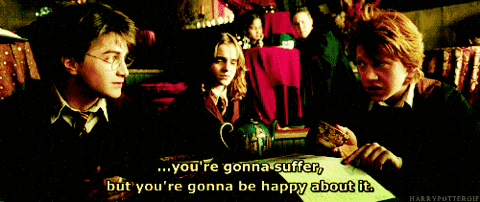
We didn’t start out great though. Oliver, B*rry and K*ra show up in Star City and rather than tell Felicity directly what is going on, Oliver chooses to keep her out of the loop. He feels they have enough problems as it is and he doesn’t want to pile on.
Sure, absolutely. Totally right call, Oliver. More lies are exactly what are required to fix your marriage. Since Felicity is angry about lying you should lie even more, so she trusts you again. Your logic is spectacular. I couldn’t be prouder.

I honestly had a very low bar as I sat down to watch the Arrow hour of the crossover. I just didn’t want to throw things at the television like I had the night before. I did not achieve my goal. The bar was much too high.
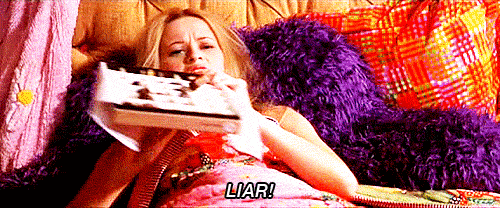
I don’t know why Arrow thinks they need to add drama on top of drama. The writers do this all the time particularly with Olicity. It’s not enough Oliver didn’t discuss going to prison with Felicity before he made a deal with the FBI. Nope! He has to make the same mistake again, so the characters are triggered to discuss it in the current episode.

Lying about prison is plenty to work through. Oliver doesn’t need to lie again, so they can talk about lying. One asinine, disrespectful, they’ve-already-dealt-with-this-issue-in-previous-seasons problem at a time please.
Then, Cisco and Caitlin try to pass it off like Ir*s knew immediately B*rry wasn’t B*rry and, once again, this proves they are true soul mates. Felicity immediately feels terrible about herself and her relationship with Oliver because she didn’t realize her husband wasn’t her husband. Maybe their disconnection is even more serious than she realized.
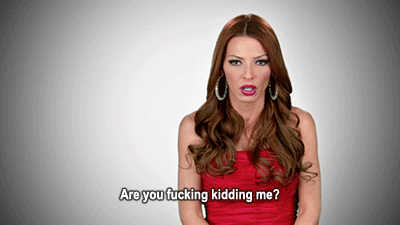
IR*S DID NOT KNOW IMMEDIATELY. She spent the better part of an hour figuring it out. When she wasn’t pawing Oliver like a cat, she was throwing B*rry and Oliver in prison because she thought they were crazy. Oh by the way, one of them was her husband, so she knowingly threw her spouse in meta human jail. She very slowly and reluctantly began to believe them 20 minutes into the episode. Yeah, that’s right. I clocked it.
When B*rry (Gr*nt G*stin) tells her, “No matter what mask I am wearing I will always show you my true face,” and tries to hold her hand she does not grab back (as far as I could tell).
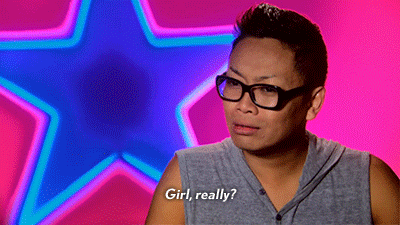
That was a hell of a line. Perfect time for some kissing, but Ir*s is more concerned about B*rry becoming Oliver. She couldn’t bring herself to return any affection from the man she believed was Oliver Queen. Sorry kids, this is not how I define “belief.” But you know soul mates.

Felicity does not spend anywhere near the same amount of time with B*rry and Oliver as Ir*s did.

Source: hollandrooden
They show up in Star City, nobody tells Felicity what is going on, she leaves to work out the lightning problem with Curtis, and the trio heads off to Gotham City.

Source: hollandrooden
Felicity spent 30 seconds with Oliver and B*rry compared to Ir*s’ 20 minutes. Yes, I clocked it again. Maybe if Felicity was given the same amount of time then she would have figured it out too.

Nobody tells Caitlin and Cisco Felicity doesn’t know, so they accidentally tell her about the body swap. Of course, it’s totally insane Caitlin and Cisco assumed Felicity’s husband told her the friggin truth right? *bleeped for barrage of expletives*

Source: hollandrooden
Felicity: It’s not every day that you find out your ex is your husband and vice versus.
Does B*rry count as an ex? I guess they had a mini date and she did wear that dress.

Also there was kissing. Yeah, okay ex it is.

Caitlin tells Felicity she shouldn’t read too much into Ir*s immediately knowing B*rry wasn’t B*rry. (I agree, particularly since she didn’t know immediately.) Caitlin says Ir*s just has more experience with B*rry screwing things up. Okay, she didn’t really say it that way, but she should have. What Caitlin says is Ir*s has more experience with alternate realities. She also shares how Team Fl*sh locked B*rry and Oliver up in jail when they tried to explain what happened.
Felicity: I appreciate you saying that but it’s just another excuse in a long list of excuses for Oliver’s behavior.
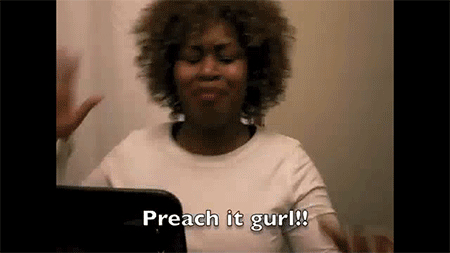
Felicity is tired and she should be. Oliver always has a reason for keeping her in the dark, but it doesn’t make it okay. Those reasons don’t excuse all the lying. What Felicity wants, what she has always wanted, is Oliver’s trust and respect.
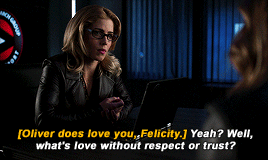
Source: oliverfelicitygifs
I really love this scene between Caitlin and Felicity because it captures the struggle of marriage so well. Your partner will hurt and disappoint you at some point. We marry imperfect people. A very large part of marriage is learning how to move past the anger and find forgiveness.
There are aspects of my husband’s personality I don’t like, but I know will never change and vice versus. Unconditional love doesn’t require you agree with everything your partner does. It doesn’t mean you can’t be angry with your spouse. However, it does require loving your spouse in spite of the things you don’t like. Unconditional love requires acceptance.
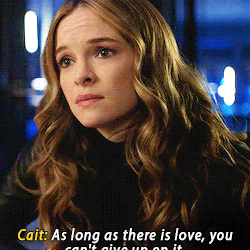
Source: unicornships
This is essentially what Caitlin is telling Felicity. Yes, they have pretty big problems right now, but the only way through it is love. You have to hold on to the love you have for your spouse and let it guide you through the times you don’t like them very much. It’s the only way bridge the anger and separation. This is how you find your way through a fraught relationship.
I am not as angry with Oliver over his lie about prison as I was about the William lie. I don’t believe Oliver’s intentions were to exclude Felicity from his life. I believe he was trying to protect her and, to some extent, himself. Oliver knew Felicity would convince him not to go to jail and at the time he didn’t see any other way. At the end of the day, his actions were heroic even though they hurt Felicity in the process.
However, Arrow has done an absolutely terrible job of explaining Oliver’s point of view. They’ve never allowed Oliver to verbalize his reasons or even offer an explanation for why he didn’t include Felicity in the decision. The viewers shouldn’t have to get their explanations via interviews with executive producers.
I know we’re all as tired as Felicity is with the lying. However, this isn’t just about Oliver lying. This is about what will never change in Oliver. He will always be the one to fall on the sword. His heroic actions will often be detrimental to his relationship with his wife because those actions require sacrifice. It requires Oliver to put other people and other things before his own happiness. His selflessness won’t always be what is best or healthiest for his marriage.
This is why it’s important they are hashing this out. Oliver hurt Felicity. He shouldn’t have excluded her from the decision, even if he was afraid she’d talk him out of it. Felicity needs to be part of these decisions, so it’s easier for her to deal with consequences. At least then she can feel like she has some control or say in her own life.

Source: hollandrooden
While Oliver was away, Felicity had to become someone else. Oliver left Felicity to the wolves and she had to learn how to protect herself. She is exploring her concept of morality and justice. Something Oliver has done a million times.
However, when Oliver returned home and saw firsthand how Felicity has changed, she wasn’t treated with the same respect, trust and unconditional love she’s shown Oliver all these years. Felicity encouraged Oliver to find another way, but she was never judgmental about it. Felicity believed in Oliver no matter what.
Felicity’s darkness still pales in comparison to Oliver’s. She may be exploring the moral grey, but it in no way compares to Oliver’s forays. Felicity was greeted with disbelief and, “This isn’t you,’ admonishments instead of understanding and love.
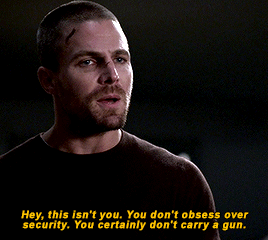
As I said, I have no problem with Felicity owning a gun, but I didn’t agree with how she used the gun in “Unmasked.” Oliver may have cause to be concerned, but he wasn’t asking the right questions to help Felicity. He was focused on what she was doing rather than listening to what she had gone through. Felicity trusted Oliver even when he was dropping bodies on a weekly basis. His judgment felt like a lack of belief and trust, which he has never felt from her even in his darkest of moments.
After spending some time as B*rry All*n, Oliver realizes he may have overreacted a bit to the changes in his wife.
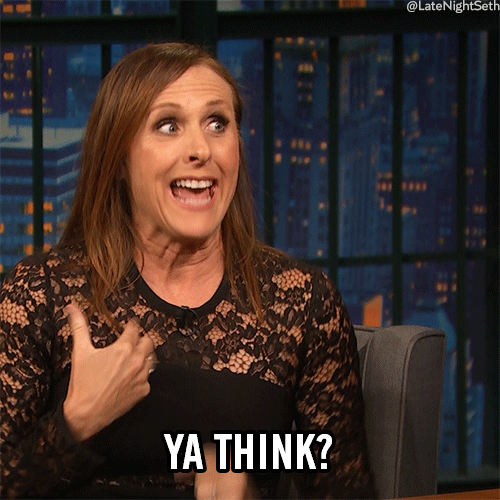
His speech is monumentally important for several reasons. Oliver has acted like a supreme jackass for the better part of seven months. He lied, excluded Felicity from decisions in her own life, and then judged his wife for the decisions she made in his absence. Homeboy needed one hell of an apology. As I said in the Watchover podcast this is bases loaded, two outs, bottom of the ninth, and in the last game of the World Series. Oliver needed to man up and be the husband (and superhero) Felicity deserves.
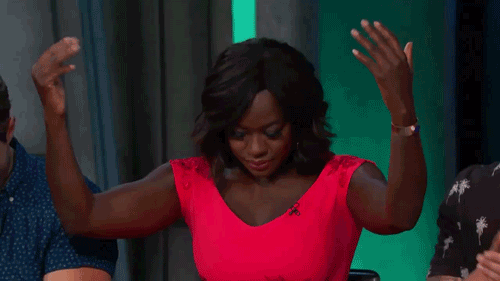
As speeches go, this is a spectacular one. If you are a long time Arrow fan, then you know this another role shift for Oliver and Felicity. Typically, it is Felicity fixing problems with a grand speech. She’s the one who expounds on how long and how much she loves him. It doesn’t mean Oliver loves Felicity any less, but he is more quiet and simple in his declarations.
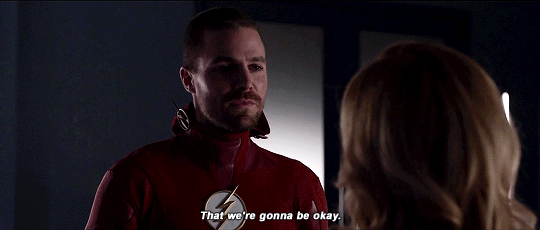





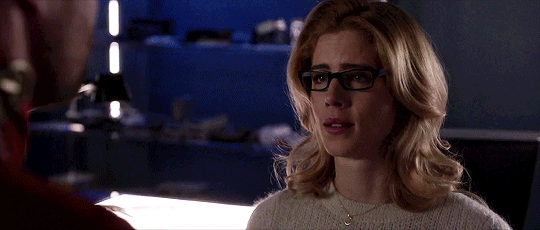
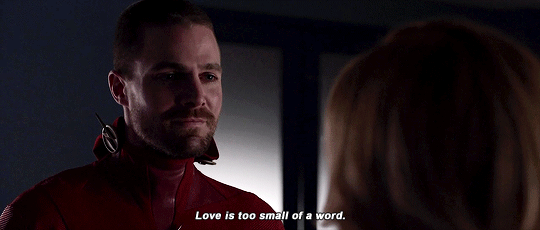
Source: oliverfelicitygifs
Not this time. This is really the first time Oliver has tried to quantify his love for Felicity. Oliver finds the English language falls woefully short as he tries to explain how much he loves Felicity, . There isn’t truly a word for how much he feels for her.
Felicity is on edge when Oliver begins talking. He tells her everything will be okay and acknowledges people change. However, none of that eases her anxiety or anger. It’s only when Oliver reassures Felicity his love for her will never change that we see her relief. Oliver may be right about all the other stuff, but what hits home for Felicity is his unconditional love. We can see how worried she was that the person she is becoming is going to cost her Oliver. What Felicity really needed to hear was that could never happen.
It’s also one of the first times Oliver’s love declaration is focused on Felicity. I love his vows, both sets.

However, when Oliver is telling Felicity how much he loves her in these moments he focuses on the impact she’s had on his life. It’s a lot about what Felicity’s love has done for him rather than what he feels only for her.
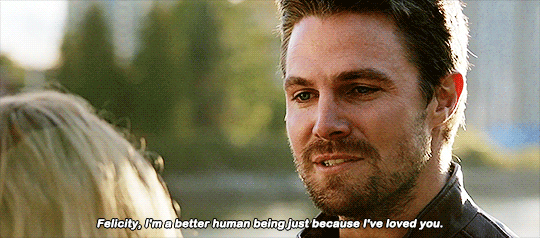
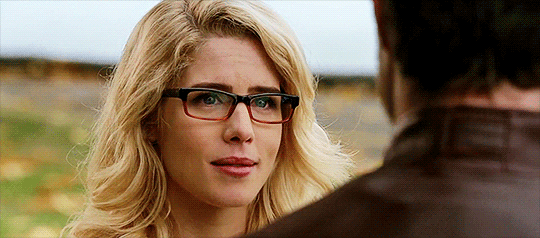
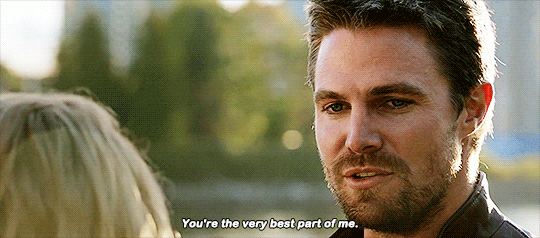
It’s not bad thing. It’s doesn’t make his vows any less powerful or amazing, because Felicity has had a life altering effect on Oliver. However, I don’t believe this was the kind of speech Oliver needed to make in this moment. He needed to focus only on Felicity and how he feels about her.
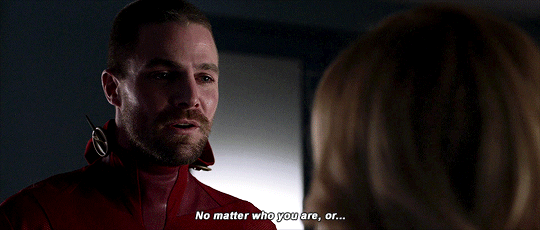
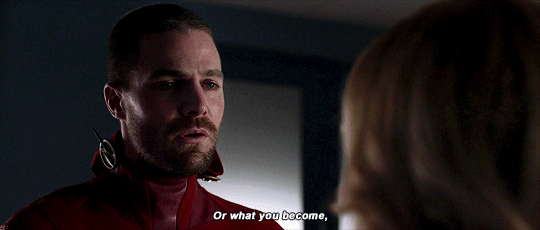
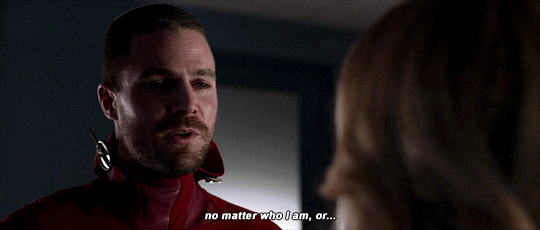
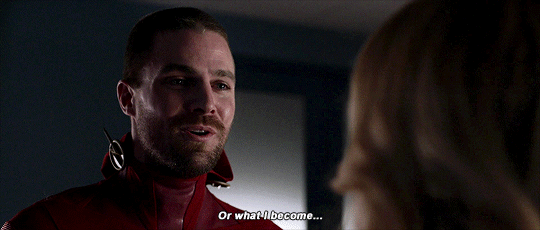
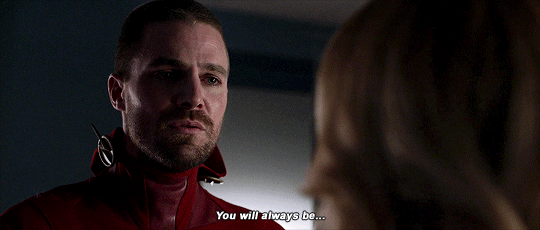
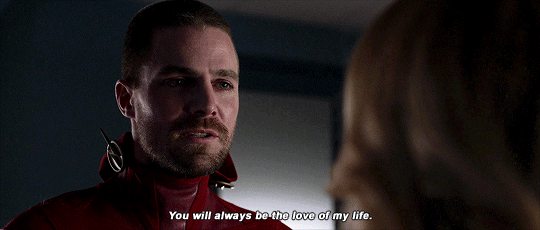
Source: oliverfelicitygifs
And Oliver does focus on Felicity. BIG TIME. His judgment is gone and in its place are respect, love and understanding. Change is not a bad thing. Oliver understands as life goes on both Felicity and he will become different people, but no matter who Felicity becomes Oliver will always love her. He marries every version of Felicity Smoak, now and forever.

Of course, we knew Felicity is the love of Oliver Queen’s life. Hearing him say the words is another thing entirely though. Oliver quantifies his love for Felicity just as she has done for him.
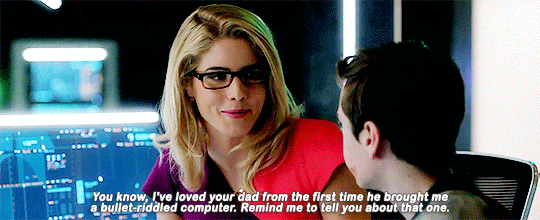
Felicity made it clear she fell in love with Oliver the moment he walked into her office. I suspected as much, so I never tire of hearing Felicity say this.
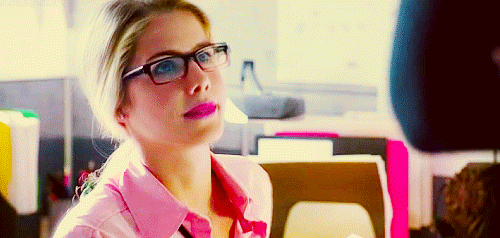
I also believe it took Oliver longer. He didn’t know what to make of Felicity Smoak at first.
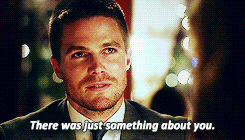

She sparked something foreign, yet familiar inside of him. Oliver came alive again when he met Felicity, but he didn’t know what it meant until later. Oliver fell in love slowly and then all at once.
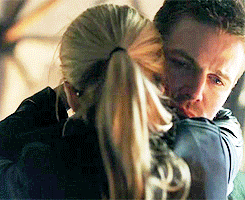
“Love of my life” puts a stamp on his relationship with Felicity in a way Oliver has never done before. There never was or ever could be another woman in Oliver’s life who he loves more than Felicity Smoak.
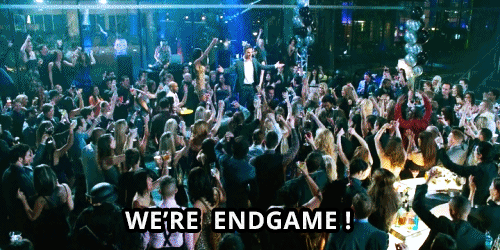
The petty side of me is also gleeful because when LL used this same terminology Oliver greeted it with silence.
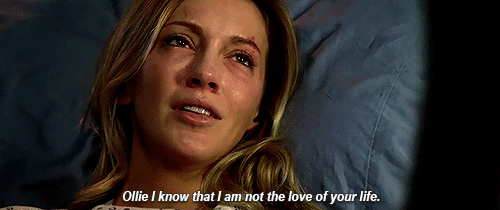

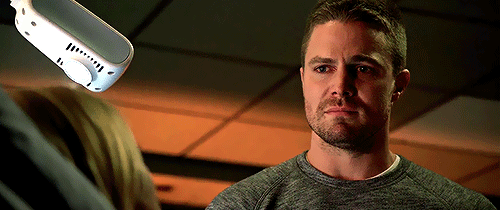
There is a vast difference between love and in love. LL stands at one of the spectrum and Felicity Smoak the other.

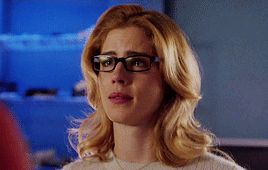
Source: felicitysmoakdaily
There is only one worth living for though and this is what Oliver is declaring. Felicity will always be Oliver’s life no matter who Felicity becomes. He will always choose her.
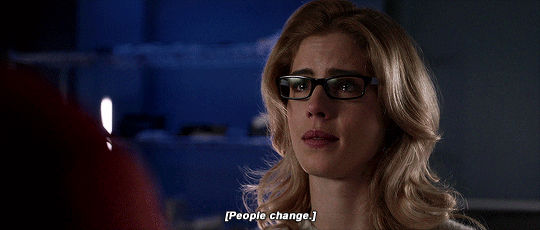
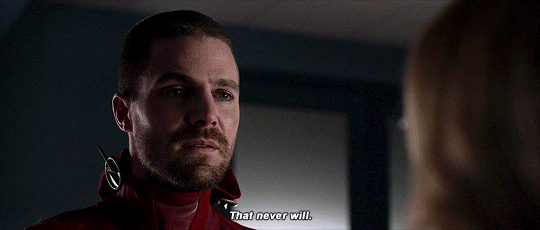
Trust is Felicity’s love language. Apologies don’t mean as much as Oliver’s belief and trust. So, Oliver saying he loves every version of her, and will be with her no matter what, is exactly what Felicity needs to hear. Oliver is giving Felicity the same love, trust and belief she’s always given him. This is the kind of husband and superhero she deserves.
If Felicity is going to continue to examine her morality, and I think she should, then Oliver needs to give her unconditional love so A) she has the freedom to explore a darker side and B) so he can pull her back if she crosses too many lines.

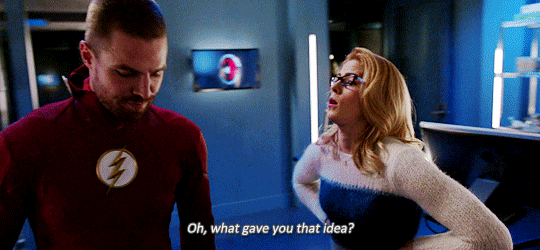
Source: felicitysmoakdaily
Oliver and B*rry have not switched back yet. Felicity believes she’s married to Gr*nt G*stin and the man standing before her, Stephen Amell, is not Oliver Queen but B*rry All*n. However, as Oliver speaks and Felicity listens to his words and hears the emotion in his voice, she knows it is him. Felicity knows this is her Oliver.
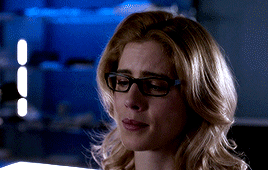
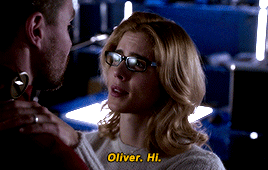
Source: oliverxfelicity
She whispers a sweet and soft, “Hi,” in recognition of who he truly is and then Felicity kisses him. I love how soft hellos are Oliver and Felicity’s way of reconnecting and reassuring. What was there in the beginning is still here today. What is most important remains unchanged.

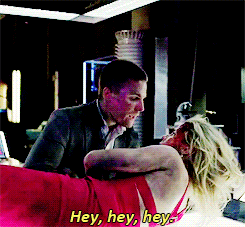

It doesn’t matter to Felicity what body Oliver is in (although this was a serious upgrade, let’s be real). She recognizes her husband anywhere.
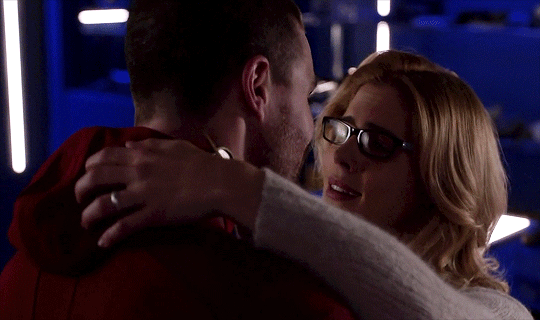
What I love even more is Felicity initiates the kiss. There is no reluctance or hesitation. Felicity embraces her husband and accepts everything about him, as he has with her.
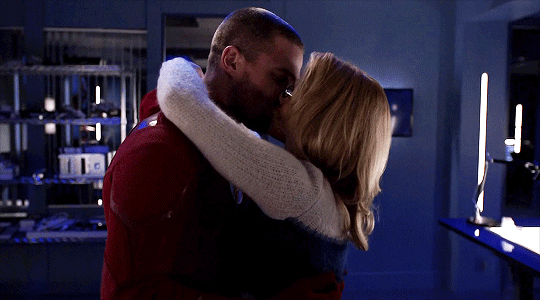
They are both becoming different people (Oliver quite literally at this moment), but the love that binds them remains intact and will for the rest of their lives.

HERE ENDETH THE CROSSOVER!

Yeah, I’m not kidding. We could stop right here. I care about nothing else. Here’s another kissing gif. *munches on popcorn*
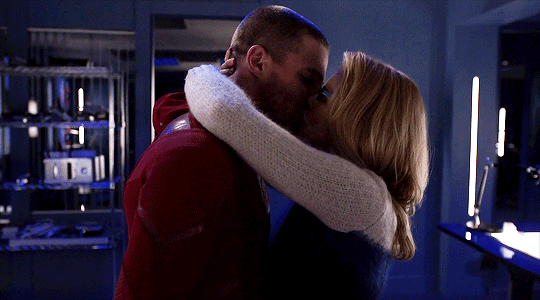
Source: oliverfelicitygifs
Flash Mitch Leary shows up and interrupts Oliver and Felicity’s much needed make out session though. Probably would have led to sex.
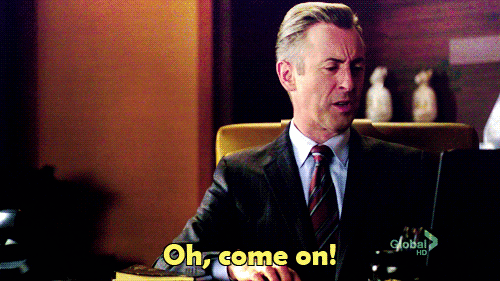
Way to go Flash Mitch Leary!
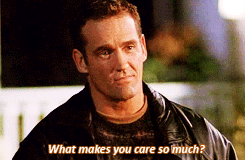
Because I do. Screw you Flash Mitch Leary.
Did you notice Felicity clung to Oliver even though he’s technically still in the wrong body? All we do is win fandom!

Source: oliverfelicitygifs
Mr. Let’s Lay off the Public Displays of Affection doesn’t seem to mind at all. Oliver has no problem with PDA. It just depends who he’s PDA-ing with.

There are a few smaller moments in the crossover which shows us the miracle Felicity Smoak has been for Oliver Queen’s life. Oliver and B*rry are comparing notes on all the ways they’ve over simplified each other’s lives. B*rry has underestimated all the pain Oliver has survived. Oliver believes B*rry’s life is easy.
Oliver: B*rry I always thought you had it easy. Sunshine and rainbows… everybody likes you.
Stephen’s reading of “everybody likes you” is spot on perfect. Oliver is a little envious of the way everyone just accepts B*rry. Through the entire crossover Oliver has been the odd man out. He even remarks, “I guess I’m running alone,” when Kara zips off with B*rry to Gotham. Everyone has been taking pot shots at Oliver and stripping him down to his most basic and unpopular attributes. He’s a dark and hopeless man who fuels his anger via a mask and calls it heroism.
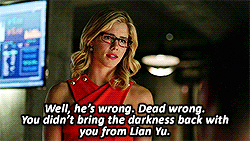
This is not the Oliver we know or Felicity knows. She is one of the few people who took the time to look beyond the surface to see the deeply good man underneath.
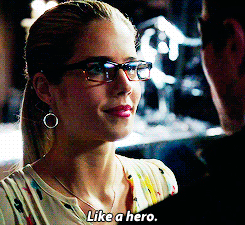
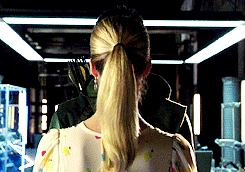
Felicity has always believed in Oliver’s light. She’s always seen the hero Oliver truly is and his ability to inspire hope. Her belief is what made Oliver believe. He became that man because Felicity Smoak loves him.
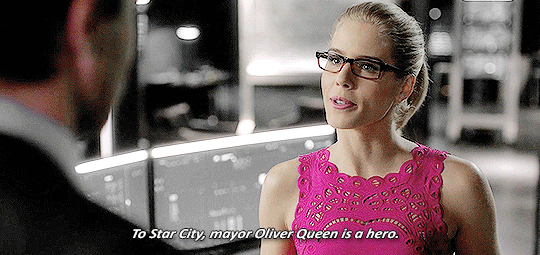
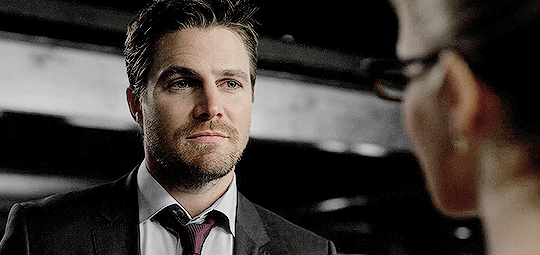
This is why the unconditional love they share with each other is so important. Even among “friends” Oliver is treated with condemnation and judgment. Felicity is a rare gift and Oliver knows it. So, he chooses to give her the same unconditional love she’s given him. Oliver experiences the loneliness of judgment and never wants Felicity to feel alone with him. This is how you bridge the gap and build a marriage which will last until “death do us part.”

Source: oliverfelicitygifs
The Trashing of Oliver Queen
The theme for this year’s crossover is “Trash Oliver Queen.” It was two hours of nonstop dragging.

Source: stephen-amell
The only reprieve we are given is during the Arrow hour of the crossover. At least those writers somewhat understand his character. Let’s run down the comments shall we?
"Oliver's life is completely defined by anger and vengeance."
"Please don't become Oliver Queen."
“Deck him B*rry! What? He’s a jerk.”
“Oliver Queen, the man who channels his hubris and anger and calls it strength.”
“One time Oliver cheated on his girlfriend with her sister.”
There’s probably more, but that’s plenty.
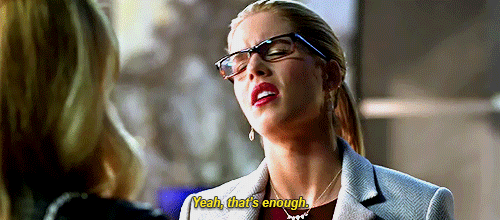
Ir*s spends the majority of The Fl*sh episode terrified she’s married to Oliver Queen or B*rry will become Oliver Queen. Since it is the female protagonist making all these statements about Oliver Queen, it is simply accepted as truth.
What’s worse is Oliver doesn’t act like our Oliver. Ir*s says Oliver is defined by anger, so he has over the top temper tantrums. I’m not saying B*rry wasn’t insulted too. However, when Oliver gets his digs in at B*rry he’s yelling. B*rry refuses to engage and walks away. This reinforces everything Ir*s has said about Oliver. It feels like the writers are saying, “See? We’re right! He’s just a horrible, dark, muscle bound hulk of angry. Isn’t B*rry so much better?” It’s disgusting. This is character assassination. Plain and simple.
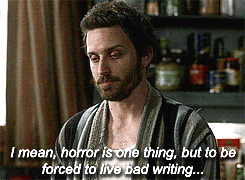
It is so bad it became distracting. I couldn’t appreciate some of the genuinely funny moments because I was too busy fuming.

I mean, B*rry is telling K*ra how slutty Oliver was back in the day.

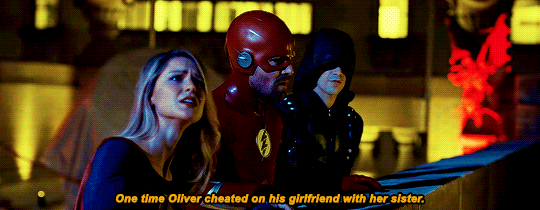
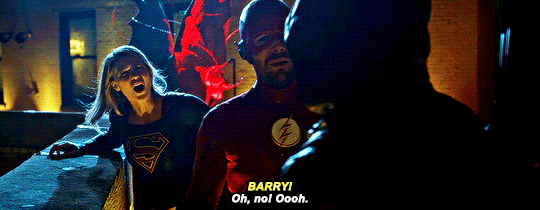
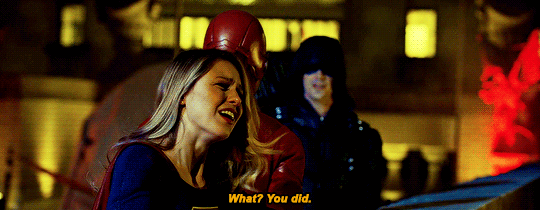
Source: olivergifs
Alright, this was a tiny bit funny, but why are we rehashing the Sarah/Oliver/Laurel debacle? IT WAS TEN YEARS AGO.
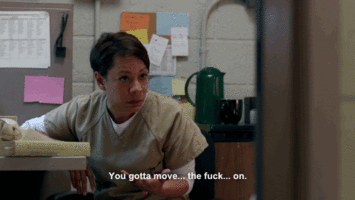
This is all an effort cast Oliver in a terrible light, while K*ra and B*rry gloat over it because he’s Gandhi and she’s Mother Theresa. Here’s a hot tip: If you are trying to get Arrow fans to watch the other shows then don’t insult their favorite characters.
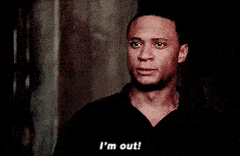
The Oliver being described in this year’s crossover hasn’t been around since Season 3. In fact, it feels like neither The Fl*sh nor S*pergirl writers watched an Arrow episode after 3x02. I am willing to acknowledge Oliver has some anger, but he has not been controlled by it or fueled by it for YEARS. I’m not talking a few episodes or a season. I’m talking actual years of character growth being ignored to write this bullshit. SEVEN YEARS to be exact.
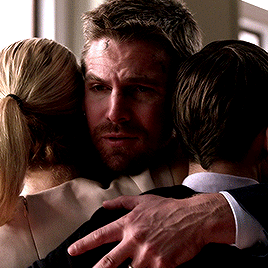
Oliver is defined by the love he has for his wife, son, team and city. This is a man who is willing to sacrifice everything for the people and city he loves. If Oliver was merely fueled by anger and vengeance he would have been done or dead years ago.
In Defense of Oliver Queen
Oliver suffered unimaginable nightmares for five years. He was tortured. Every single person he ever loved either died for him or because of him. He could never fully trust anyone. He had to make life and death decisions every day. He had to forge himself into a weapon, strip himself of his humanity, to survive.
The process in which Oliver Queen became the Arrow and the process in which B*rry All*n became the Fl*sh are night and day. B*rry was struck by lightning. But Oliver? Oliver became the Arrow through sheer force of will. He worked for it, trained for it and bled for it. His survival depended on it.
B*rry didn’t lose himself when he became The Fl*sh. Oliver had to stop being Oliver Queen. He had to stop trusting. He had to stop believing. He had to stop hoping. He had to stop caring. He had to stop loving. He had to stop being a person. It was the only way for him to survive. Humanity was just another thing that could kill him.
And yet, despite everything Oliver suffered, he retained his goodness. He fought his way back from the depths of hell and held onto his humanity. He found a way to love and hope again. Oliver Queen is a miracle.
This incessant need The Fl*sh has to compare B*rry to Oliver is a foolhardy endeavor. There is no competition, but writers confident in their character don’t need to trash another one to feel superior. Maybe The Fl*sh has to insult Oliver Queen because deep down they believe their hero doesn’t measure up. It makes me wonder because I’ve never seen television writers treat the characters that launched their show so terribly – and yes I include Felicity and Diggle. Oliver is written as a violent monster, Felicity is a ditzy bimbo, and Diggle could care less B*rry erased his daughter. Every time I watch an Arrow character on The Fl*sh they are a stranger to me.
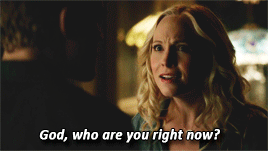
I don’t know y’all. This all feels like a massive inferiority complex.

Arrow has clearly shown there is a light in Oliver Queen just as inspiring as B*rry All*n’s or Sup*rgirl’s. Oliver has evolved far beyond the man who came home from Lian Yu. He isn’t Season 1 Oliver no matter how hard The Fl*sh and Sup*rgirl try to characterize him that way.


He has evolved far beyond dough. Oliver is a baked cookie Felicity gets to munch on and enjoy.
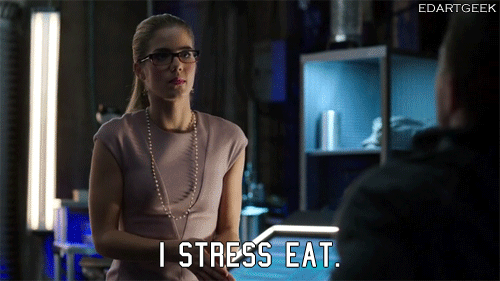
In fact, Oliver’s heroism is what inspired B*rry to become the friggin Fl*sh to begin with!
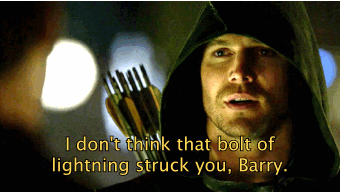
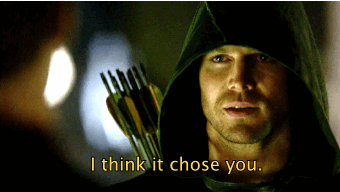
Yeah, that’s right Fl*sh people. I am not letting you forget your fave is a spin off launched from ARROW. No matter how much you trash Oliver Queen it isn’t going to erase history. The DCTV universe became a success because Arrow is a success. This is like pretending Ironman had nothing to do with Marvel’s movie franchise. Give me a friggin break. RESPECT YOUR ELDERS.
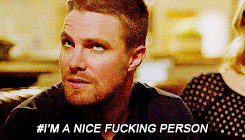
We also have to deal with severe continuity issues. Ir*s tells Oliver (who she thinks is B*rry) about how angry Felicity is he cut a deal with the feds without discussing it with her. Oliver looks shocked to hear this.
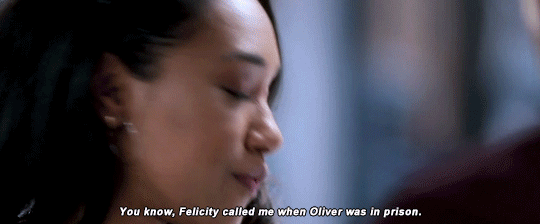


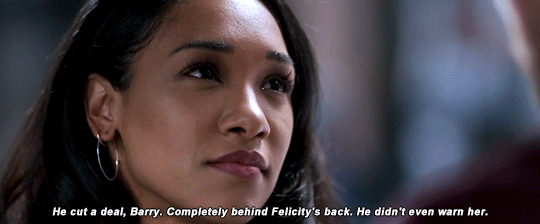
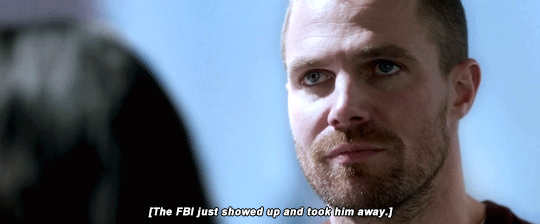

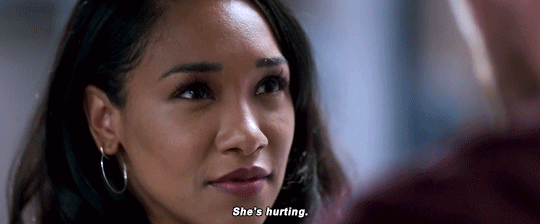
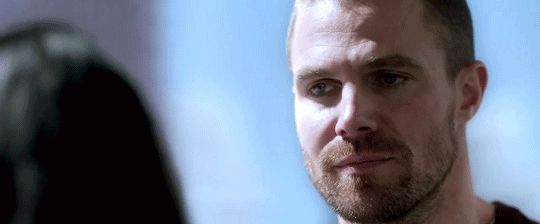
Source: oliverxfelicity
SHOCKED.
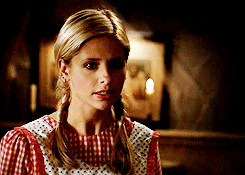
Oliver knows Felicity is pissed about him going to prison. He’s known it for seven months. If Oliver forgot then it was explained to him again during the massive fight he had with Felicity about it last week. It is clear The Fl*sh writers have not watched a single episode of Arrow this year, which is just aggravating.
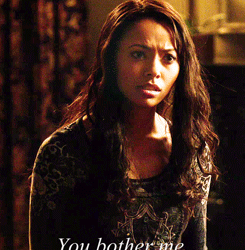
This is all evidence to Ir*s that Oliver is a horrible person and she is so grateful she married Rainbow Brite. There is absolutely no way she could be married to Oliver Queen. Listen, cutie why don’t you take your moral condemnation and shove it where the sun doesn’t shine?
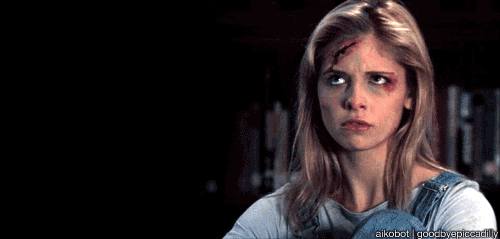
I seem to recall Rainbow Brite, aka B*rry All*n, made the exact same decision a few seasons ago. Didn’t B*rry go into the speed force without discussing it with you? Sure he did. In fact, Mr. and Mrs. Gold Standard went to couple’s therapy over it.
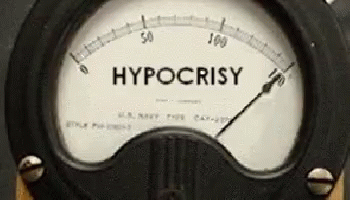
If there’s a storyline on Arrow then chances are The Fl*sh has copied it. I would be careful with the examples of how awful Oliver Queen is because I can match you example for example with how awful B*rry All*n is. At least Oliver pays for his mistakes.
If these characters had said Oliver’s life is completely defined by anger and vengeance during the first crossover (and they did) I would have said this is an incomplete picture of him. However, I could understand why someone who just met Oliver would feel like it is true. But we’re in SEASON SEVEN of Arrow. These people have fought side by side together for four years.

Ir*s’ attitude towards Oliver doesn’t even make sense. She was at his friggin wedding while he was bursting with sunshine and moonbeams. Ir*s knows Oliver is a good man, so this is equally an assassination of her character as well. But what else is new on The Fl*sh?

Even B*rry’s reactions to Oliver’s interactions with Ir*s are insane. He tells Oliver not to touch Ir*s. When Oliver assures B*rry he hasn’t he responds with, “You thought about it.”
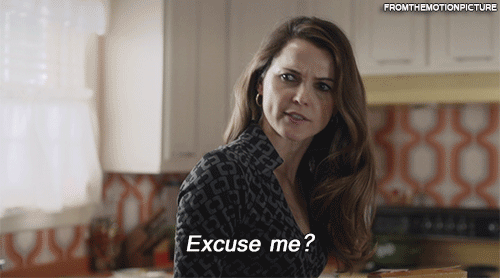
ARE YOU KIDDING ME? NO HE HASN’T. All Oliver has wanted from the second he woke up was to go back to his own bed where his REAL wife is.
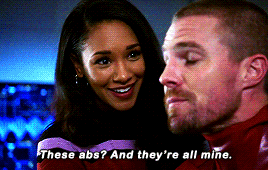
The one climbing Oliver like a tree is Ir*s. The fact Ir*s is attracted to him isn’t a surprise to Oliver.

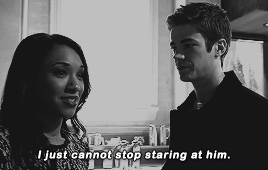
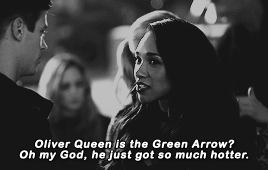
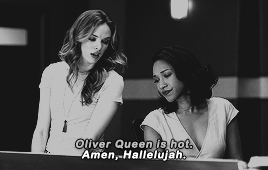
Source: supercanaries
This is not a detail she’s kept quiet over the years, but is also not something Oliver has encouraged.
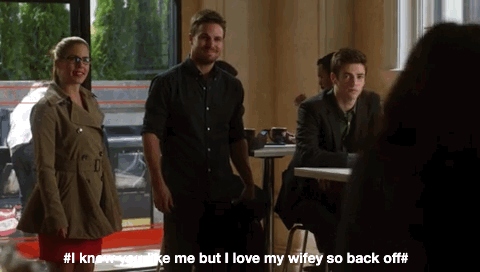
He practically glued himself to Felicity anytime Ir*s came near him.
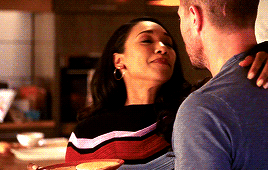
Source: supercanaries
Oliver is frozen with shock and horror she acted on it. This was not the face of a man who has “thought about it.” Take up your insecurities with your wife Bartholomew and leave Oliver out of it.

However, if we’re talking about who “thought about it” then I submit this as evidence.

Source: amunetblack
Spot the difference? This is the face of a man who is clearly enjoying himself. If there’s anybody thinking about touching his friend’s wife then it’s B*rry. Not Oliver. I don’t think either of them “cheated” but what annoyed me is the only one we’re commenting on is Oliver. B*rry, you dated Oliver’s wife. You’ve had TWO non platonic kisses. You are lucky to be alive. So, let’s cool it with the accusations.

Frankly, this year’s crossover feels like a retreaded ground. This argument B*rry is light and Oliver is dark was one made in the first Arrow/Fl*sh crossover. Both men had to learn and appreciate the kind of hero the other was. All the lessons B*rry and Oliver are learning this year are ones they’ve already learned. Only this time B*rry and Oliver have to switch lives. This is what running out of ideas looks like.

I mean, come on y’all. They actually had a scene where B*rry is held hostage, but convinces Oliver not to kill Deegan because “there’s a better way.”
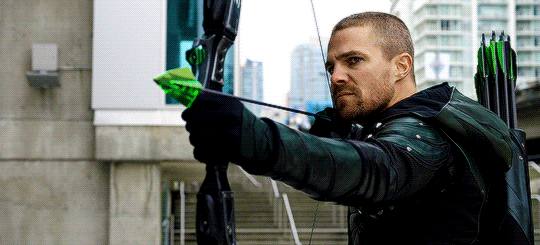
Source: olivergifs
WE. DID. THIS. EXACT. SCENE. IN. SEASON. 2.
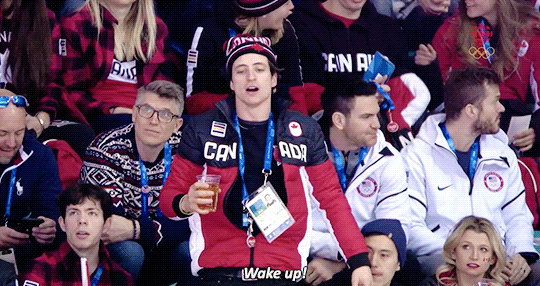
I cannot even with this nonsense.

Oliver stopped killing in Season 6!!! But it’s because of B*rry Oliver decided to find another way.
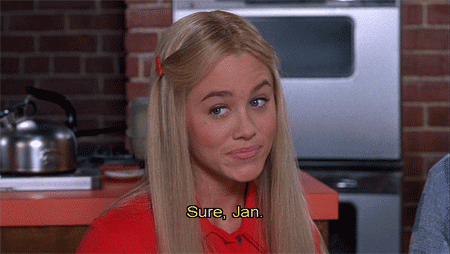
Unbelievable.

Do I think Oliver is going back to “I’m full of darkness” during the regular Arrow season? No. I don’t. We’ll go back to our regularly scheduled programming. Oliver will be our Oliver, complete with all seven seasons of character growth, and acting like the man we know and love. What happened in the crossover is all ridiculousness to sell the crossover story, which is continuing into “Crisis on Infinite Earths” in the fall of 2019.
If you think I am overreacting to how The Fl*sh characterized Oliver’s character then I would simply ask you to flip it. How would you feel if Felicity was talking about B*rry the way Ir*s spoke about Oliver? How would you feel if all of B*rry’s mistakes were dragged? How would you feel if the other characters believed B*rry’s selfishness represents everything he is? How would you feel if Arrow ignored five years of B*rry’s character growth? How would you feel if the other characters responded to B*rry as anything other than the hero he is? How would you feel if this wasn’t the first time B*rry All*n was insulted guest starring on Arrow? Methinks you would have a problem with it.
I am a little disappointed in myself for being so surprised. This has been a problem on The Fl*sh for a very long time. This behavior never happens on Arrow, I might add. The Arrow writers do not insult and trash B*rry’s character, so Oliver can look morally superior. So, thank you “Elseworlds” for reminding me why I stopped watching The Fl*sh. The writers are incapable of being respectful towards the character that launched their show.

What Did Oliver Promise?
Oh Lord Oliver. Why do you have to be so damn heroic all the time? It is highly problematic.
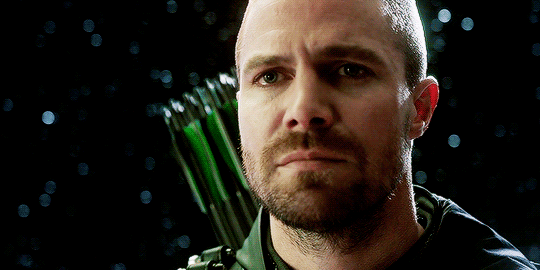
Source: olivergifs
I didn’t pay much attention to the plot, because the plot made no sense.

Source: clevercloudpoetry
This was fine for hours one and two, but then crap actually started to matter during hour three.

I couldn’t understand why people were freaking out online about what Oliver promised. If you’d like to hear my realization in real time then listen to the latest episode of Watchover.

Oliver: You said I’d past the test if I knew my true self. Well, my true self is filled with darkness, but B*rry and K*ra are different. They inspire hope. They inspire people because they are the best of us.
Did Oliver promise his life to the Monitor in exchange for those ungrateful twats, B*rry and K*ra?
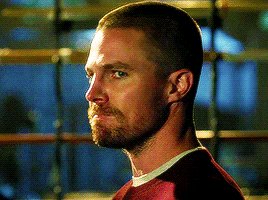
Source: @olivergifs
You bet he did.
This is why they are trashing Oliver so much in this year’s crossover. Oliver will sacrifice his life and B*rry, K*ra & Co., will realize he was a true hero all along.

I might have to start saying a rosary to get through this.

OR they could have simply treated Oliver like the hero he is and the plot in the crossover would have made sense. I’m just brainstorming here. Don’t want to get too crazy with the ideas.

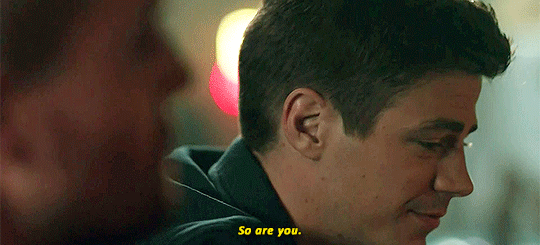


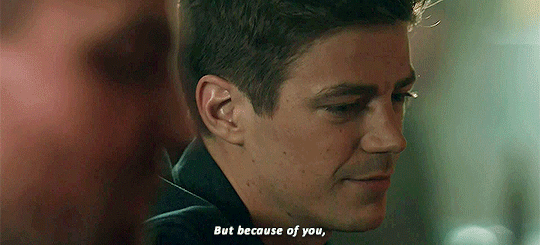
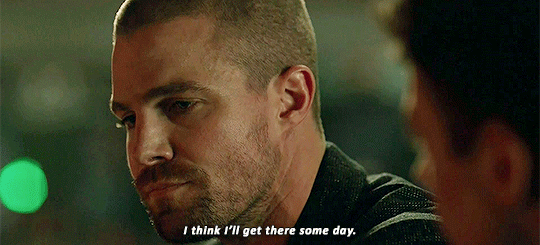
Source: someone-like-robsten
Yup. Oliver will be a hero because of B*rry kids.

Oliver is not so subtle alluding to exchanging his life for Barry’s, hence his “I’ll get there some day,” but the line irritates me because this whole crossover irritates me.
Arrow has been moving Oliver toward a more defined moral code. He’s becoming the light for Star City. However, everyone acting like there’s been no character growth in this man for the last 7 years simply to sell this “Oliver is going to die” storyline in the crossovers is pure madness.

This dovetails nicely into the flash forwards doesn’t it? Essentially “Elseworlds” confirms, or at least heavily hints, Oliver dies and everything goes to shit because of it in the future. Well played, Beth Schwartz.
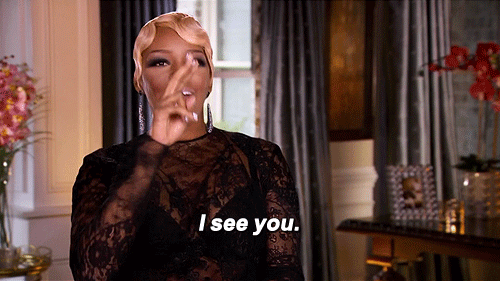
Are they going to kill Oliver? Yes, but it won’t be permanent. I mean, just say it out loud with me and you’ll hear how ludicrous this sounds.
Oliver dies during the “Crisis of Infinite Earths” or sooner. Felicity raises their children on her own. Star City goes to hell in a hand basket in 20 years. Felicity becomes an evil super villain determined to destroy the city and then she’s murdered.
HERE ENDETH THE SHOW.
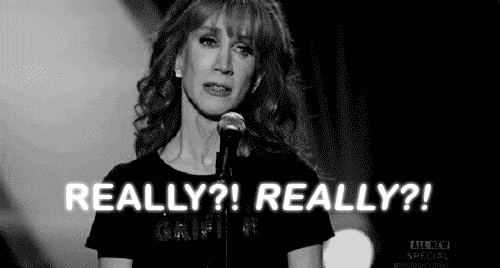
No. Absolutely not. I reject all of this. This is what Arrow (and the crossovers) are telling us happened, but these are same people who said Oliver is all darkness. So pardon me if I find their word suspect.

I believe there’s a high likelihood Season 8 could be Arrow’s finale season. In the midst of all this trashing of Oliver Queen, there also seems to be a consistent “passing of the guard” mentality. B*rry and K*ra are the heroes the world needs and Oliver is a piece of crap that kills people with arrows. It’s all in an effort to disentangle the Arrowverse from Arrow and Oliver Queen. Then they re-center it around B*rry All*n.
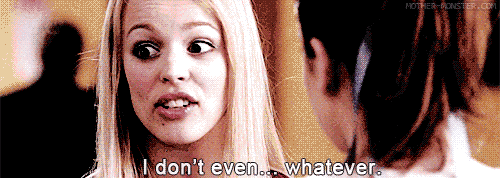
If Season 8 is the final season then Arrow just spoiled how their show ends. Oliver dies. Everything goes to crap in the future, but then his band of legacy heroes save the city 20 years later. Is it possible? Sure, absolutely. A hero’s journey can end with death, but announcing it or heavily foreshadowing like this takes away the shock factor.

This is classic diversion and red herrings. The writers want the fans freaking out Oliver is going to die while they are doing something else entirely. This reminds me a bit of Season 4. Everyone was so busy worrying about Felicity dying, and the red herrings pointing to her death, that nobody was noticing how Arrow was setting up Laurel’s death at the same time.

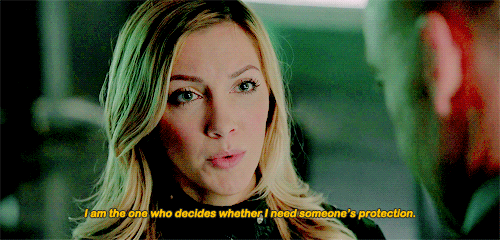
Yes, they are setting up Oliver’s death.
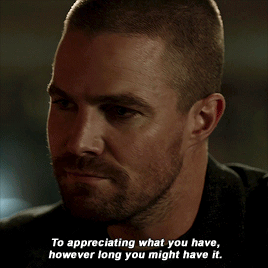
Source: olivergifs
However, they also set up Oliver’s happy ending.
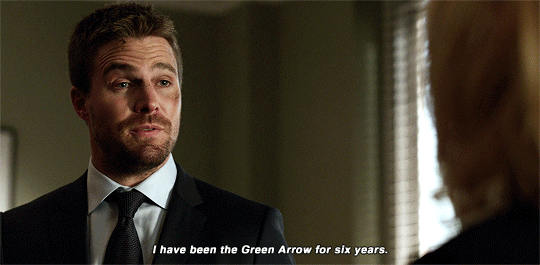
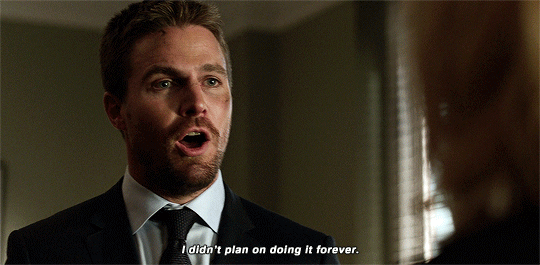
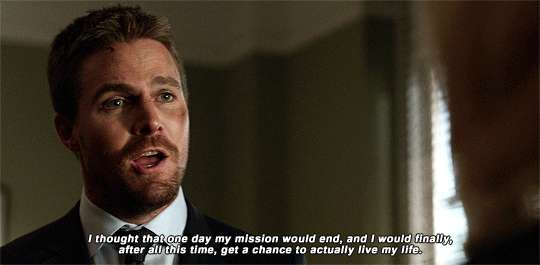
He wants to hang up the hood and live in peace with his family. The point of the “Elseworlds” promise is for Oliver to sacrifice his happy ending so the world can have the true heroes like B*rry and K*ra fighting for it. However, Oliver sacrificing his happy ending proves he’s just as selfless a hero as they are. But balance I guess.
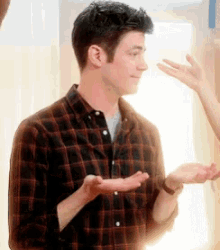
All the “Oliver is darkness” nonsense is so heavy handed too. When Arrow introduces plot lines like this so early on, basically telling us how it all ends, then I give it major side eye. If Season 8 is the finale season then they aren’t telling us how Arrow ends a year before the next crossover.
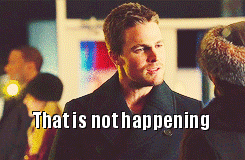
So what is “Crisis on Infinite Earths?” Here’s a link explaining it more in detail, but essentially an evil version of The Monitor begins destroying the multiverse. Let’s call him Satan Monitor. A bunch of superheroes die and there’s only one universe remaining at the end. Satan Monitor has a side kick named Psycho Pirate. This is the masked man talking to the professor in Arkham. “Crisis on Infinite Earths” is also when B*rry All*n disappears (which has been a major plot point on The Fl*sh) and Sup*rgirl dies in the comics. This is the sum total of my knowledge.
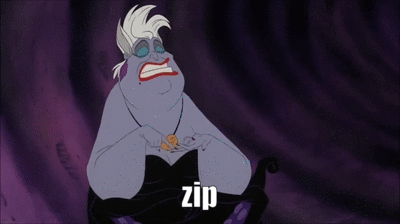
We are supposed to believe the Green Arrow sacrifices himself for the universe and this is the ending of Arrow. However, “Crisis on Infinite Earths” will air in the fall of 2019. This is the beginning of Arrow’s 8th Season. Not the end. The other crossovers have always aired in the winter. They are not killing Oliver Queen in the beginning of Season 8. Nope. Not happening.

The fact they are threatening to kill Oliver so early is good for us. We always want the premiere and mid season to be a shit show, so we can get a happier ending in the finale. Consider the last time Oliver “died.”

Things worked out okay for him in the end.

And yeah, that’s also my hang up. They’ve already written the perfect death scene for Oliver Queen. It aired four years ago. Been there. Done that.
The Monitor: Are you truly that eager to die? No, not eager, but willing. Ready to.
Oliver willing to sacrifice himself is not a shock. This is not a man who fears death. When Oliver returned to Starling City, he did not expect to survive. He thought he would come back, save the city, but die in the process as some kind of atonement for his sins.

As the season progresses, Oliver’s humanity begins to return and he becomes more and more attached to those he loves. This creates a struggle for him because he does not expect to live. This is why he told Tommy as he died,
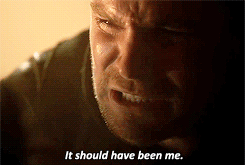
So, it’s tough for me to see death as the ending for Oliver Queen. Yes, it’s possible. I won’t deny that, but I feel it is the more unlikely scenario. Particularly since the writers are heavily hinting at Oliver’s death and want us to be worried about it.
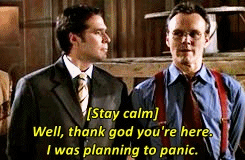
David told a fan at HVFF San Jose the flash forwards are one of the possible futures and we’d understand more in the crossover.
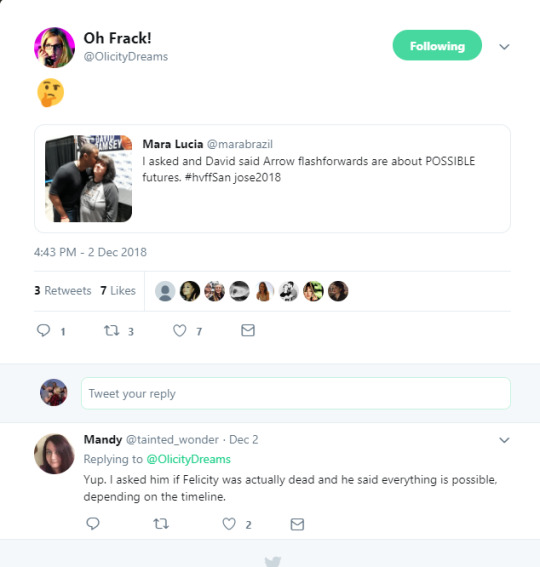
@callistawolf and I were so confused because this is directly opposite of what Beth had said in interviews. TV Guide said Beth, “…confirmed that this is a fixed future, so we don't need to worry about B*rry All*n (Gr*nt G*stin) turning up and resetting the timeline or anything.”
However, went I looked back at her Collider interview that’s not exactly what she said. She merely confirmed this future is not connected to Legends and the characters don’t know what happens in the future.
Is this a fixed future that we’re seeing, or is there the possibility that they can change things?
SCHWARTZ: This is not connected to Legends. This is our own future. They don’t know what happens in the future. Legends is like that and The Flash is like that, but on Arrow, they don’t know. This is very much for the audience. They don’t know what’s happening to them, in the future. It’s better that they don’t know.
She dodged answering the “fixed future” portion of the question. I have yet to find an interview where Beth comments on permanency. Sorry, David. We were wrong to doubt you.
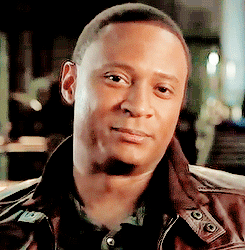
We’re thinking whatever happens to Oliver is fixed during next year’s crossover. Maybe Oliver dies in the Season 7 finale as a fulfillment of his promise. Whatever happens during “Crisis on Infinite Earths” could trigger a change in the flash forwards. Right now, they can kill Oliver and explore what Star City is like without the Green Arrow in the flash forwards. If Star City has gone to hell then obviously this proves the Green Arrow is needed in the world, because he is also a true and inspiring hero. Oliver ultimately survives “Crises on Infinite Earths” and is able to save his city in present day. Then we are given a totally different future.
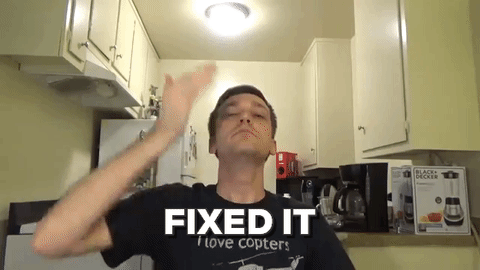
How are they going to fix it? I have no idea. Superman was ushered off to his happy ending with a pregnant Lois. So, maybe he comes back and exchanges his life for Oliver’s. Not sure. I’m just spit balling here. There’s lots of X factors I can’t answer, but this gives the Arrow writers the chance to write both an unhappy and happy ending. We don’t have all the details worked out. Maybe Oliver dies during “Crisis on Infinite Earths” and is brought back another way. It’s totally possible Oliver promised something other than his life too.
However, they want us to believe Oliver Queen is going to die so I wouldn’t expect to see him in the flash forwards any time soon. But it makes no sense to kill Oliver Queen at the end of Season 7 or the beginning or middle of Season 8, when we know Arrow still has a whole season to film and Stephen Amell is under contract.
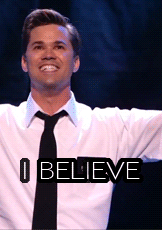
The big question is does Oliver tell Felicity what he promised? I want to say yes, but I’m not holding my breath. Oliver’s heroic actions tend to run counter to his happy life with Felicity. Do I imagine there’s a world in which Felicity will be okay with Oliver sacrificing himself for B*rry and K*ra? NO. It’s the same issue we had with the prison arc. I absolutely think Oliver should tell Felicity, but I just don’t have confidence he will at this point. Hopefully, I am wrong.
Stray Thoughts
Stephen Amell and Gr*nt G*stin have amazing chemistry. They are the perfect straight and funny man team. There are genuinely hilarious moments throughout the entire crossover, but most of the funny occurred during The Fl*sh hour. Stephen Amell truly cracked me up. I wish I could have enjoyed it more.
I'm still comfortable with my hot dog meets sperm description for Stephen in The Fl*sh suit.
Are B*rry's abs photoshopped too? I have questions.
"There's no way I could be married to Oliver Queen. I mean babe come on. He's not my type." This gag will never get old for me. I love it.
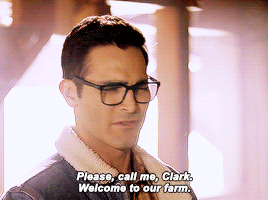
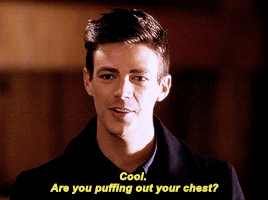
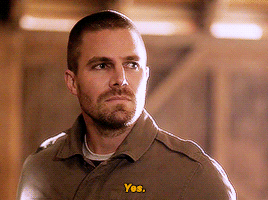
Oliver going all alpha male around Superman is the realest thing about this crossover. Source:olivergifs
“I think a night in jail would do them some good.” HAHAHA Bl*ck S*ren left Oliver in jail for the night. Classic.
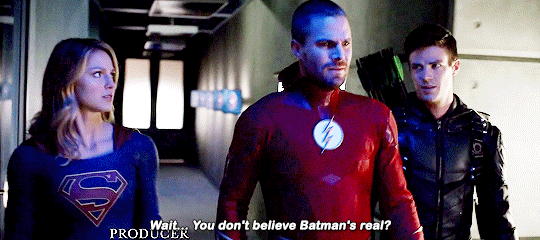


Oliver’s pettiness over Batman will never not be funny. Source: dailydcheroes

Kate Kane is awesome. Something about her suit bugs me though. Can’t figure out what. Source: veronica-lodge
Joe Wilson is a scarier villain in the two minutes he had on screen than Diaz has been in a season and a half.


I like how Felicity refused to dumb her genius down for Diggle. He is so in the dog house with her. Source: felicitysmoakgifs

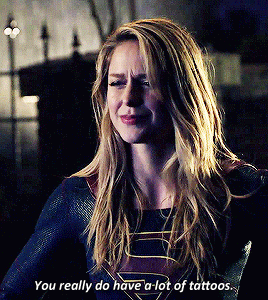
Who is going to tell Sup*rgirl she is gay or bi? Because she is. There was a lot of flirting coming from Batwoman and K*ra D*nvers didn’t seem to mind at all. Don’t even get me started on her chemistry with Lena Luthor. So yeah. Somebody tell her. Facts are facts. I’m with you SuperCorp! Source: amunetblack
If we’re talking Oliver’s worst fear I’d pick Adrian Chase over Malcolm Merlyn, but whatever. Nice to see you again John Barrowman.
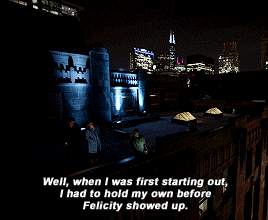
I love how they showed how good Oliver is with computers. Nice moment of continuity from the Arrow pilot. Source: oliverfelicitygifs
Arrow filmed a whole new opening with Gr*nt G*stin, but was Stephen Amell afforded the same on The Fl*sh? NOPE. It was weird.
I think Sup*rgirl got the shaft story wise. She spends all her time refereeing B*rry and Oliver. I think we could find better uses for her character.
Jimmy Olson has facial hair and nothing makes sense anymore.
Is Dante alive in this reality? If not, maybe don't bring him up B*rry.
Is Superman getting his own show too? This is a lot about Superman. (Superman proposes to Lois and they move to Argo to raise their love child.) Nope. Superman is not getting his own show.
I think if you can make your own diamonds you could go at least 4 carats Clark.
Disclaimer: Any gifs on the blog are not mine. If you would like a gif removed from my reviews, please message me. 7x09 gifs credited.
If you’d like to support the blog, please buy me a cup of tea!
#arrow#arrow reviews#olicity#arrow crossover#arrow spoilers#superflarrow crossover#arrowverse crossover#oliver queen#felicity smoak#anti barry allen#anti iris west#anti the flash#anti supergirl#anti kara danvers#arrow season 7#arrow season 7 reviews#season 7 episode review#season 7 episode reviews#anti westallen
156 notes
·
View notes
Text
‘Master Q+A’ Continued: Scott Conary
We keep going with our ‘Master Q+A’ with Scott Conary from the April + May 2020 issue of Barista Magazine, as he discusses the beginnings of barista competitions, their impacts on café culture, and how they have changed.
BY KENNETH R. OLSON
BARISTA MAGAZINE
In our April + May 2020 Fifteenth Anniversary issue of Barista Magazine, I had the opportunity to interview Scott Conary for our “Master Q+A” feature. Scott has spent the better part of two decades as a barista competition judge, and in the course of our interview, he had much more to share about the competitions and their evolution than we had room to fit on the printed page. As we wait for barista competitions to resume again sometime in the future (and here’s hoping it won’t be too long), this seemed like a good time to share Scott’s thoughts and reflections on the growth and change he’s witnessed firsthand as a judge.
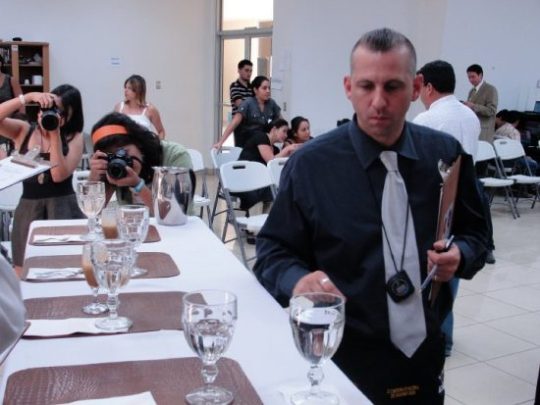
Scott judges at the Honduran Barista Championship. He has judged national and international barista competitions for almost 20 years.
Kenneth R. Olson: Do you have any funny stories from your years of judging that would highlight how much things have changed from, say, 2003 to 2020?
Scott Conary: Recently, I and a few others have been digging into the archives to come up with some fun memories of the “way it was,” somewhat spurred on by the memory lane effort when WBC celebrated 20 years.
Looking at past scoresheets is a really interesting study in evolution, the things we thought were important (and they were, ostensibly, at first!) It reminds me that when we started, education was such a large part of what the competitions did. That won’t ever go away exactly, but how that education was implemented has changed dramatically.
The first step was to set standards and best practices that can be adhered to and scored. This was a big deal for the majority of folks who never took a class or were trained consistently, and a lot of the early years for comps were getting larger and larger numbers of people onboard to achieve those current standards.
Once that became better known (and disseminated widely through other outlets like Barista Guild of America certifications used as a jumping-off point from classes and workshops), the method of education and the focus of the competitions can be shifted to more exploratory and innovative. So instead of thinking that the competitions should mirror the real-world café setting, we were able to look at the competitions as a kaleidoscope of possibility—what is possible in our industry.
You can argue that for this next phase to be the most successful, it required that base of knowledge that the competitions helped spread worldwide. Now you can have a conversation with folks from around the world and not only agree but understand each other in terms of basic best practices.
With that established, the competitions can continue to evolve into an even better format for pushing the boundaries of what is possible in specialty coffee. And that is the part that everyone remembers: the new stuff, the crazy ideas, the innovations and demands by professional baristas to manufacturers to make better machines. Never before had there been such a response, in so short a time, to customer requests of ideas for improvements. So many of the things we take for granted now in our industry were forged in the fires of competition.
How important is it to get that score of six for coffee waste? So important that grinder manufacturers designed on-demand grinders. This wasn’t something that was being asked for specifically in cafés, but items like scales on and in drain trays, pressure, temperature, and flow rate, all of the various dose and distribution tools—all of these were pushed to creation from the desire for higher scores in competition.
I have a gift and curse for being able to wipe my memory clean between competitors and competitions. This probably stems from my scientific background and desire to remain as unbiased as possible, but what it means is, I often have to be reminded by friends who were there with me about all the crazy things we went through and drank.
It’s fun to remember that we required sugar, which we knew we would never use, at service, with the thought that we wanted to emulate a café setting. Or that all four beverages needed to be served at once (meaning there was a big boom in the tray industry for some time, until Stephen Morrissey showed us how to balance them all on our arms in 2008).
Are there any trends you’ve noticed over the years that may have started in barista competitions and have gone on to become common in retail?
So many! Methods of preparation, tools for dose and distribution accuracy (scales, OCD, and other distribution and tamping tools), investigation and insights into ratios and liquid weight (beverage volume) out.
Even just the aesthetic of an organized and clean station, as the “Knowledge” standard for presentation, has its origins in the competition. Modbar was just the next logical step for this open presentation format, where everything is being “judged,” and no hiding from the “technical judge/customer.”
A really fun thing to watch from the 1,000-foot viewpoint, and the luxury of seeing it for so long, are the stages that people, countries, and cultures go through as they get involved in competitions. Sometimes the simplest form is mimicry. This can have something to do with the advent of social media and the start of performances being viewed on video and YouTube. Often since the foundational things cannot be transmitted through camera (quality of beverages, balance of espresso, etc.), what people pick up on are the visuals … what people are wearing, glassware used, styles of presentation and speech. For a couple of years after Michael Phillips won [the World Barista Championship] in 2010, so many competitors in distant parts of the world were wearing suspenders, as if that was part of the secret to winning.

Scott in the middle of three World Barista Champions (Klaus Thomsen, Michael Phillips, and Stephen Morrissey) celebrating the end of another WBC in Bogota, Colombia, in 2011, with Lani Peterson and Emily Oak in the foreground and Amber Fox behind Scott.
Are there any performances, signature drinks, or something else from competition that stand out to you in particular?
There are too many to remember clearly, but what stands out are moments when you can see or feel a groundswell of change—a pivotal moment when the game is changed, and people can tell.
Focusing on WBC champions, Michael Phillips took the judges to task in 2010 with a complicated signature beverage and comprehensive presentation that really put judges to the test. This was a bit of a wake-up call and kept our efforts in training judges moving forward to be sure not to be the weak link in this partnership we have with baristas for innovating our industry.
If a barista can manage something in the time provided, we as judges need to be up to the task of evaluating its merits. I remember judging this routine in the USBC finals (since I recused myself for finals at WBC), and appreciated the orchestrated way information was shared, such that one didn’t really need to take notes, but simply experience and absorb. This idea of a presentation that is so well done that simply by experiencing it the judge remembers everything, is my gold-standard definition for new judges when it comes to thinking about the level of what they have experienced.
And then there are the innovators. Folks who I have told them how much I appreciate their willingness to push boundaries and try something new on a stage that is merciless and might not score as well as something safer. But their desire to share this innovation is stronger, at least to some degree, than simply wanting to win (of course they want both). Colin Harmon is one of these people. Year after year he brought something engaging and chancy to the stage to the judges’ delight, I think with the knowledge that it might be difficult to score, and I made sure to thank him for continuing to push every time.
Both James Hoffmann and Stephen Morrissey showed us that a presentation did not have to be elaborate, but could be informative, insightful, and simply focus on delicious coffee. Alejandro Mendez and Raul Rodas took charge of the swing toward origin at the time, to really tie every aspect back to the coffee’s journey, often with a very personal touch, as the first two WBC champions to come from coffee-growing regions.

Scott with 2016 World Barista Champion Berg Wu and Berg’s wife, Chee Lu.
In terms of signature beverage patterns, I remember distinctly that around 2009 was the “year of the bacon” (which was specifically challenging for me, not eating red meat), and 2010-2014 had a significant rise in the use of cascara.
What role do you think barista competitions have in promoting the profession and specialty coffee?
The competitions have already gone such a long way in promoting and developing the profession of barista—from setting best practice standards that have influenced coffee professionals around the world (and made it easier to find delicious coffee almost anywhere), to increasing the exposure of the craft and profession—sometimes to a mocking level, but still raising awareness of the effort and skill required to do this thing correctly and thus engage customers worldwide in the idea that there is a value worth paying for. Naturally it’s not 100% effective, very little is, but the proof exists that a change has happened and continues to happen, and it allows more coffee shops and professionals to flourish than ever before for customers who are willing to pay for the increased quality.
The post ‘Master Q+A’ Continued: Scott Conary appeared first on Barista Magazine Online.
‘Master Q+A’ Continued: Scott Conary published first on https://espressoexpertsite.tumblr.com/
0 notes
Text
50 Character Backstories (11-20)
Before getting started, a shout-out to @asuccessfulbusinessman for providing excellent input on my game. He’s good Filthy Assistant material!
11. Bounty – Someone, somewhere, wants you and has offered a cash reward for your capture or death. You might know about the bounty from encounters with bounty hunters or wanted posters or you might know all the details from firsthand experience.
Do you know who posted the bounty against you? Are you wanted for a crime or have you wronged a private individual? How much is the bounty for? How long has the bounty been out for?
12. Jilted Lover – You were supposed to be in a romantic relationship, arranged or spontaneous, but something about it went catastrophically wrong. Either you or your perspective mate fled the relationship and attempted to vanish. The fleeing lover might have left a note or explanation, but the end result is an empty bed and probably some hurt feelings.
Were you or the other party the one to flee? Are they/you being sought after? Were the families impacted by the failed relationship? Has the escape left an emotional scar on either party?
13. Adventuring Archaeologist – You are a seeker of great treasure, and the more dangerous or illegal the ruin the better! The thrill of the adventure pulls at you any time you pass by a ruin or cave and the mere whiff of a treasure map sets your blood on fire. The treasure at the end may not even be the most important part of the experience for you. Hat and whip are optional but encouraged.
How was your first dungeon excursion? What do you do with any artifacts they find? Why did you take up delving in the first place? Do you have any scholastic interest in the ruins themselves?
14. Missing Family – Some member of your family has gone missing. They might have been kidnapped by an enemy for ransom, or they've stolen the family heirloom and fled, or perhaps they've simply vanished without a trace; either way, you're on a quest to find them. Or, if they can't be found, perhaps you'll just learn what their fate was.
Why are you so concerned over this family member above all others? What was your last memory with them? Are you worried for their safety, angry at them for leaving, or something else? How long have you been searching for them?
15. Scholar – Unlike the majority of people, you have had a formal and extensive education. This education might grant you a more precise speaking manner, useful knowledge, or perhaps nothing more than a pretentious social circle. The school itself might be a huge affair with hundreds of pupils or a small academy for ten at a time. Training offered could be as esoteric or generalized as you wish.
Was the school for a specific trade or more general education? Did you gain any useful contacts during your time there? Was it a boarding school where rich parents shuffled off their young for years at a time? Did the time cloistered leave you with a somewhat naïve or odd view on the world?
16. Traitor – At some point in your past, you betrayed someone who trusted you implicitly. You might have been forced into the action by an outside force or it might have been for personal gain, but the fact remains; you acted and a close confidence was harmed.
Who did you betray and why? Did your betrayal lead to the ally or friend's death? If they're still alive, did they forgive you or do they still hold a grudge? Does the betrayal weigh heavily on your mind? Would you betray another close relation if needed?
17. Escaped Criminal – You were caught committing a crime severe enough to warrant prison time. You might have been set up as the fall guy or perhaps you were a career criminal who slipped up; either way, you spent time incarcerated. After spending some time behind bars though, you escaped back to freedom.
Did you have help escaping? After you got out, did you resume your criminal activity? Did you have to create a new identity once free? While inside, did you make any useful contacts? Are the authorities hunting for you?
18. Failure – You attempted to join an exclusive faction that required an initiation trial; a trial that you failed. Whether it was due to bad luck or poor decision making, the failure prevented you from joining and further might have endangered other members. Perhaps the faction is also interested in secrecy or has other reasons for wanting to see failed members killed.
What caused you to fail your task? Did the faction let you go without any consequences or are they seeking to harm you? Do you regret your failure or does it otherwise stick in your memory?
19. Terminally Ill – Unfortunate, but you were born with or contracted a terminal disease. You don't know how long you have left to live either; it could be years or weeks. For now, you aren't suffering debilitating symptoms yet, but they might develop later.
How does your slow death sentence affect your outlook? Do you fear death or has your disease emboldened you? Is the illness communicable? Are you experiencing any early symptoms?
20. Wild Born – You grew up as a lone feral in the wild instead of within the bounds of civilization. Whether you were abandoned as a youth, were raised by beasts, or simply were left alone in the wilderness, you were a grown adult before you encountered a settlement or other people.
If you speak a language, how did you learn it? How did your first experience with civilization go? Do you have any memories of your family? Did exposure to other cultures affect your way of life?
3 notes
·
View notes
Text
Year: 2002 (The Aftermath of 9-11-2001)
Toby Keith – Courtesy of the Red, White and Blue (The Angry American)
www.youtube.com/embed/ruNrdmjcNTc" frameborder="0" allowfullscreen></iframe>
This video is a summary in musical form of the September 11, 2001 terror attack on the U.S. It provides analogy after analogy to explain how the country was before 9-11, what happened, how it happened, how the U.S. citizens felt afterward, what the U.S. response will be, and how the U.S. will respond.
Toby uses the first two versus of the song to state the patriotism of Americans and to thank past military veterans for fighting for our freedom. These versus define the country prior to 9-11. Analogies in these two versus include saluting, recognizing Old Glory, and a lot of men dead so we can sleep in peace.
The third verse explains that the country was attacked by subterfuge in the analogy of “sucker punch flyin’ in from somewhere in the back”. This part of the third verse is used to explain what happened and how it happened on 9-11. The third verse then explains how the U.S. felt afterwards by the use of the “black eye” analogy, and how the U.S. will respond with the analogy of “light up your world like the 4th of July”.
However, all this information is in the form of a rhythmic, rhyming cadence that invokes a patriotic sense of pride in the video’s audience. Most of the key words in the aforementioned analogies are visually illustrated throughout the video.
According to Songfacts, Toby Keith told the CBS show 60 Minutes that he wrote this song in just 20 minutes, a week after 9-11. His intention was to play it for troops on USO tours but not to be part of a commercial release. However, after playing it for Pentagon brass in Washington, the Marine Corp commandant said, according to Keith: "You have to release it. You can serve your country in other ways besides suiting up in combat."
Aaron Tippin – Where the Stars & Stripes & The Eagle Fly
www.youtube.com/embed/TTKmjhJ1__o" frameborder="0" allowfullscreen></iframe>
This video is patriotic and sings the praises of all the basic freedoms and blessings of the citizens of the U.S. Aaron also uses analogies in this song to be able to express his love of this country in his music. Examples include “there’s a lady that stands in a harbor for what we believe” and “a bell that still echoes the price that it cost to be free”.
In the wake of 9-11, he is trying to express patriotism and support of New York and the devastating effects of that day. The whole video is meant as a means to bolster patriotism and to be uplifting of the country as a whole.
The video opens with various views of the city, its residents, well-known structures and the various types of emergency responders from the city, such as firefighters, city police and state police. In the shots of emergency responders, the video zooms in on the various badges and patches of the uniforms. He uses images of citizens with foreign descent to symbolize the “melting pot” of our culture. Examples include Hindus, Asians, Hassidic Jews, and a man wearing a turban.
There are scenes throughout the video showing the Red Cross volunteer workers in various situations. The importance of this is understood after reading the MTV News article regarding the single released of this song, that includes a recording of “You’ve Got to Stand for Something” on the B Side. All the proceeds of the sales of the single were donated to the American Red Cross to aid victims of the terrorist attacks.
Throughout the whole video, the shots of Aaron singing and playing the guitar are always in front of an extremely large U.S. flag. At the very end of the video, a man’s arm is shown with a tattoo partially exposed. The bottom of the tattoo reads “In God We Trust 9-11-01”.
3 Doors Down – When I’m Gone
www.youtube.com/embed/_iXqCvkW1pg" frameborder="0" allowfullscreen></iframe>
This video’s lyrics aren’t obviously related to 9-11 at first glance, but the video illustrates the direct result of that day: the military response. From the beginning of the video to the end, scenes of military deployment, the return of veterans who have been deployed, and military troops in current service, and the military in combat are shown, as well as the effects it has on families of those military members.
Since a deployment requires a military person to leave his/her home, and possibly even the U.S., the meaning of lyrics of the song then become clear in their relationship to 9-11. The men and women in the U.S. military forces need love and support when they are deployed, which was subtly suggested in the lyrics of this song.
Brad Arnold, lead singer, also uses analogies in this song. The first verse discusses “another world inside of me that you may never see” in a compartmentalized fashion, suggesting the civilian life versus the military life. Later in the last verse, he sings “part of me is fighting this but part of me is gone.” This analogy could be interpreted in several ways: his body is in the physical fight, but his mind is somewhere else, maybe home; or that fighting in the war has changed him, and even though he wants to come back home, part of him is gone, since he will never be that same person who left.
According to an interview between Brad and Songfacts, the lyrics don’t have anything to do with war or the military. However, the video was dedicated to all the men and women serving in the U.S. military. The song gained popularity around the time the U.S. was preparing to invade Iraq. For many people in the military, the song said a lot about how they were feeling being away from their families and loved ones, and reminded them that everyone back home was still thinking of them.
Bruce Springsteen – Nothing Man
www.youtube.com/embed/NKYYChoQIvI" frameborder="0" allowfullscreen></iframe>
This video shows scenes from 9-11 throughout the whole video. There are no illustrations of the lyrics at all. Many of the scenes are recognizable from the news coverage of the event. The scenes are not in any specific order, and some are repeated.
The lyrics are written from the viewpoint of a male first responder who witnessed the 9-11 event firsthand. The man is viewed as a hero due to his actions on 9-11, as per the lyrics, “how my brave young life was forever changed”. The misty cloud of pink vapor referred to at the end of the first verse is a reference to the blood spilled. Although others view him as a hero, he does not, which is why he refers to himself as “the nothing man”. According to Rolling Stone Magazine, the song is described as a lush, haunting ballad and seems to give voice to the emptiness and incomprehension felt by some of that day’s surviving heroes.
The event did not change the way that life functions every day, but on the other hand, it changed other things for him dramatically. The lyrics refer to “Friday night club meets at Al’s Barbecue”, which is one example of how the lives around him continue on as though nothing changed or happened. He sees himself as an every-day, normal Joe and nothing special. He is having trouble processing what he witnessed that day, and the song ends with him praying that he is able to continue living, although he considers suicide.
Work Cited
“3 Doors Down Lyrics.” AZLyrics,
www.azlyrics.com/lyrics/3doorsdown/whenimgone.html. Accessed 8 Oct. 2017.
“Aaron Tippin Lyrics.” AZLyrics,
www.azlyrics.com/lyrics/aarontippin/wherethestarsandstripesandeaglefly.html. Accessed 8 Oct. 2017.
Arnold, Brad. Interview by Shawna Ortega. Brad Arnold from 3 Doors Down. Songfacts, Songwriter Interviews,
www.songfacts.com/blog/interviews/brad_arnold_from_3_doors_down/. Accessed 8 Oct. 2017.
“Bruce Springsteen Lyrics.” AZLyrics,
www.azlyrics.com/lyrics/brucespringsteen/nothingman.html. Accessed 8 Oct. 2017.
“Courtesy of the Red, White and Blue (The Angry American).” YouTube, uploaded by TobyKeithVEVO, 16 June 2009, www.youtube.com/watch?v=ruNrdmjcNTc. Accessed 8 Oct. 2017.
Keith, Toby. Songfacts. Toby Keith. www.songfacts.com/detail.php?id=5041. Accessed 8 Oct. 2017.
Loder, Kurt. “Bruce Springsteen: The Rising.” Rolling Stone, Jann Wenner, 30 July 2002, www.rollingstone.com/music/albumreviews/the-rising-20020730. Accessed 8 Oct. 2017.
“Nothing Man.” YouTube, uploaded by Jürgen B., 19 Mar. 2008,
www.youtube.com/watch?v=NKYYChoQIvI. Accessed 8 Oct. 2017.
Orr, Jay. “New Aaron Tippin Song to Benefit Red Cross.” MTV News,
www.mtv.com/news/1448903/new-aaron-tippin-song-to-benefit-red-cross/. Accessed 8 Oct. 2017.
“Toby Keith Lyrics.” AZLyrics, www.azlyrics.com/lyrics/tobykeith/courtesyoftheredwhiteandbluetheangryamerican.html. Accessed 8 Oct. 2017.
“When I’m Gone.” YouTube, uploaded by TheHybridPro1, 5 Oct. 2012, www.youtube.com/watch?v=_iXqCvkW1pg. Accessed 8 Oct. 2017.
“Where the Stars & Stripes & The Eagle Fly.” YouTube, uploaded by Chris Tognan, 12 Sept. 2007, www.youtube.com/watch?v=TTKmjhJ1__o. Accessed 8 Oct. 2017.
0 notes
Text
Upsizing on the Upswing: The Big Decision More Homeowners are Making
For Rhiannon Kruse, moving to a bigger home was about facing the music.
For five years, Kruse and her husband had squeezed themselves into a downtown Seattle high-rise. At 700 square feet, their home meant giving up a dresser to cram clothing into an under-the-bed storage space, and limiting the number of guests they could invite over for dinner. Even Kruse’s parents had to stay in a hotel after making the six-hour drive from Oregon to visit; there just wasn’t enough space for overnight guests.
But for the duo, both professional entertainers, the final straw may have been the makeshift recording studio they crammed into a tiny desk space, wedged between the bed and the window. It just wasn’t practical for a couple that make their living as piano players, Kruse says.
“We had a keyboard setup and a desk and recording equipment. To play, we had to wear headphones because we were in a shared space,” Kruse says. “We definitely maximized the space, but everything had to have a purpose.”
So when Kruse’s husband broached the idea of moving into a much larger house just outside the city limits, it took a little bit of convincing - but not much. The couple fell in love with a 2,700-square-foot new construction home about 15 miles north of the heart of the city.
They also fell in love with the idea of having a place to put a piano - an actual piano.
“My grandmother had given us her grand piano. It was sitting in a storage place for two years,” Kruse says. “[Now] I play a lot more at home. Probably five times as much - and when I do, it’s relaxing. I don’t feel suffocated.”
Rhiannon Kruse and Jeff Coleron in front of their home on the day they moved in. Photo courtesy Rhiannon Kruse.
“People want these larger houses”
The couple’s story may not seem like much of an anomaly these days. They’re part of an uptick in upsizing: More homeowners are opting for a bigger home and larger price tag, skipping the traditional starter home altogether. Millennials are especially part of this movement, according to Zillow research.
What’s more? A new analysis of census data shows that the median square footage of new homes is up 20 percent since 2000, from about 2,000 square feet to about 2,500 square feet.
The data corresponds with what sociologists are seeing firsthand, says Brian Miller, an associate professor of sociology at Wheaton College, just outside Chicago. Miller, who studies cities, suburban migration and culture, argues that several factors could be impacting the shift in housing trends, including the strength of the national economy.
“I see a lot about tiny houses and micro apartments in Seattle, San Francisco, and New York - these cities who are really grappling with housing issues and trying to fast-track 200- or 400-square-foot apartments,” Miller says. “And yet the overall pattern across America is that people want these larger houses.
"The economy has gotten better over the last few years,” he continues, with a nod to cities like Dallas, one of the hottest housing markets in the country. “It seems it’s enabled people to [buy large houses] again.”
Popular culture may be influencing this decision as well, Miller adds, pointing to how homes are depicted on television, in both the reality and scripted genres.
“The typical home on TV is huge. Think about the ‘Friends’ apartments, which were impossibly large,” he says. “I’m thinking of HGTV shows I’ve seen over the past few years, where the dining room seats 10 or 12. I don’t have those parties, but if you’re watching HGTV, it just seems like everything is huge.”
Popular reality and scripted TV shows often depict larger homes as the norm.
Growing home size, guided by research
The abundance of larger homes in popular entertainment isn’t by accident. Home design shows are rooting their programming in extensive research, says Julie Link, director of research and consumer insights for Scripps Networks, which owns HGTV, the Food Network, and others. The company recently conducted an in-depth, comprehensive study they called Dynamics Shaping the Future of Home.
The study’s goal was to better understand what is going on in the lives and in the homes of Scripps Networks’ audience in order to cater programming to them. The network asked consumers to complete video journals, diary entries, collages, and even Pinterest boards.
“We don’t want to be showing million-dollar homes when we’re in a recession,” Link adds. “We want to be reflective of what’s going on in the homes of our viewers.”
The results? Both surprising - and not. Younger consumers (adults between 25 and 39 years old) are beginning to prioritize space, the study found. Fifty-six percent of millennials said that having a large home is important to them, compared with 42 percent of Gen Xers and just 35 percent of baby boomers.
As millennials move into larger homes, they often delay buying new furniture and decorative pieces until they find just the right item.
Once young homeowners find the perfect space, many are biding their time until they find items that are multi-functional and carry meaning, Link continued. They might wait to fill an empty wall until, say, they can frame Instagram photos from a favorite trip, or afford to purchase a high-tech yoga mat that can also double as an elegant carpet.
“Millennials want a story behind [what they buy]. They’re doing this to create a sanctuary,” Link explains. “The world is a chaotic place right now, no matter what your views on politics are. [Millennials] really look inward, and they want to control something. The easiest thing for them to control is their home.”
Open floor plans reflect modern lifestyles
Add that focus on intentional buying to the shift in how homes are designed, with a nod to larger, open spaces. Gone are the days of rigid, closed-off eating spaces or television rooms. In their place are open floor plans and shared spaces, says Mary Dignan Hill, a real estate agent with John Aaroe Group in Southern California.
“Definitely I would say a home design trend is happening. People don’t have formal dining rooms, or aren’t interested in formal dining rooms anymore,” says Dignan Hill. “A more casual lifestyle is becoming more common, and I can see that reflected in home design.”
Dignan Hill, who has worked in real estate for a decade, recently noticed more clients seeking out open floor concepts or renovating older homes to take down walls to create larger, open spaces.
“People want to be able to be in their kitchen and cook, but also be with their family,” she notes. “Where you used to have a separate kitchen, a separate dining room and a separate television room, it’s all becoming one big space.”
Open floor plans’ popularity derives from the flexibility they provide homeowners.
Room to stretch
Two years after upsizing from 700 square feet into her 4-bedroom, 3-bathroom home, space is still a novel idea to Kruse - and one she doesn’t take for granted.
“Now that I have the extra space, I understand it. I understand why people want to do it,” she says. “I really don’t miss living in the condo, and I thought I would.”
She mentions the give-and-take of their old, cramped quarters: How, when she lived in the small condo, if she bought a shirt, she’d have to get rid of an old one. A new pair of shoes meant donating a worn-out pair to charity. It was a dance of space.
Most importantly, her new 2,700-square-foot home - with backyard raspberry bushes, fire pit, and private recording space - just brings her peace, she says.
“I had felt so tense living downtown,” Kruse recalls. “When we finally got to space and we could stretch and everything - a lot of that tension was alleviated.”
Find out how much upsizing would cost you in major U.S. metro areas.
Related:
Your New, Bigger Space: 5 Ways to Win at Upsizing Your Home
Bigger Homes and Gardens: Caring for Your New, Upsized Outdoor Space
6 Critical Questions to Ask When Buying New Construction
0 notes
Text
Upsizing on the Upswing: The Big Decision More Homeowners are Making
http://ift.tt/2vxCS3r
For Rhiannon Kruse, moving to a bigger home was about facing the music.
For five years, Kruse and her husband had squeezed themselves into a downtown Seattle high-rise. At 700 square feet, their home meant giving up a dresser to cram clothing into an under-the-bed storage space, and limiting the number of guests they could invite over for dinner. Even Kruse’s parents had to stay in a hotel after making the six-hour drive from Oregon to visit; there just wasn't enough space for overnight guests.
But for the duo, both professional entertainers, the final straw may have been the makeshift recording studio they crammed into a tiny desk space, wedged between the bed and the window. It just wasn't practical for a couple that make their living as piano players, Kruse says.
"We had a keyboard setup and a desk and recording equipment. To play, we had to wear headphones because we were in a shared space," Kruse says. "We definitely maximized the space, but everything had to have a purpose."
So when Kruse's husband broached the idea of moving into a much larger house just outside the city limits, it took a little bit of convincing - but not much. The couple fell in love with a 2,700-square-foot new construction home about 15 miles north of the heart of the city.
They also fell in love with the idea of having a place to put a piano - an actual piano.
"My grandmother had given us her grand piano. It was sitting in a storage place for two years," Kruse says. "[Now] I play a lot more at home. Probably five times as much - and when I do, it's relaxing. I don't feel suffocated."
Rhiannon Kruse and Jeff Coleron in front of their home on the day they moved in. Photo courtesy Rhiannon Kruse.
“People want these larger houses”
The couple's story may not seem like much of an anomaly these days. They're part of an uptick in upsizing: More homeowners are opting for a bigger home and larger price tag, skipping the traditional starter home altogether. Millennials are especially part of this movement, according to Zillow research.
What's more? A new analysis of census data shows that the median square footage of new homes is up 20 percent since 2000, from about 2,000 square feet to about 2,500 square feet.
The data corresponds with what sociologists are seeing firsthand, says Brian Miller, an associate professor of sociology at Wheaton College, just outside Chicago. Miller, who studies cities, suburban migration and culture, argues that several factors could be impacting the shift in housing trends, including the strength of the national economy.
"I see a lot about tiny houses and micro apartments in Seattle, San Francisco, and New York - these cities who are really grappling with housing issues and trying to fast-track 200- or 400-square-foot apartments," Miller says. "And yet the overall pattern across America is that people want these larger houses.
"The economy has gotten better over the last few years," he continues, with a nod to cities like Dallas, one of the hottest housing markets in the country. "It seems it's enabled people to [buy large houses] again."
Popular culture may be influencing this decision as well, Miller adds, pointing to how homes are depicted on television, in both the reality and scripted genres.
"The typical home on TV is huge. Think about the 'Friends' apartments, which were impossibly large," he says. "I'm thinking of HGTV shows I've seen over the past few years, where the dining room seats 10 or 12. I don't have those parties, but if you're watching HGTV, it just seems like everything is huge."
Popular reality and scripted TV shows often depict larger homes as the norm.
Growing home size, guided by research
The abundance of larger homes in popular entertainment isn't by accident. Home design shows are rooting their programming in extensive research, says Julie Link, director of research and consumer insights for Scripps Networks, which owns HGTV, the Food Network, and others. The company recently conducted an in-depth, comprehensive study they called Dynamics Shaping the Future of Home.
The study’s goal was to better understand what is going on in the lives and in the homes of Scripps Networks’ audience in order to cater programming to them. The network asked consumers to complete video journals, diary entries, collages, and even Pinterest boards.
"We don't want to be showing million-dollar homes when we're in a recession," Link adds. "We want to be reflective of what's going on in the homes of our viewers."
The results? Both surprising - and not. Younger consumers (adults between 25 and 39 years old) are beginning to prioritize space, the study found. Fifty-six percent of millennials said that having a large home is important to them, compared with 42 percent of Gen Xers and just 35 percent of baby boomers.
As millennials move into larger homes, they often delay buying new furniture and decorative pieces until they find just the right item.
Once young homeowners find the perfect space, many are biding their time until they find items that are multi-functional and carry meaning, Link continued. They might wait to fill an empty wall until, say, they can frame Instagram photos from a favorite trip, or afford to purchase a high-tech yoga mat that can also double as an elegant carpet.
"Millennials want a story behind [what they buy]. They're doing this to create a sanctuary," Link explains. "The world is a chaotic place right now, no matter what your views on politics are. [Millennials] really look inward, and they want to control something. The easiest thing for them to control is their home."
Open floor plans reflect modern lifestyles
Add that focus on intentional buying to the shift in how homes are designed, with a nod to larger, open spaces. Gone are the days of rigid, closed-off eating spaces or television rooms. In their place are open floor plans and shared spaces, says Mary Dignan Hill, a real estate agent with John Aaroe Group in Southern California.
"Definitely I would say a home design trend is happening. People don't have formal dining rooms, or aren't interested in formal dining rooms anymore," says Dignan Hill. "A more casual lifestyle is becoming more common, and I can see that reflected in home design."
Dignan Hill, who has worked in real estate for a decade, recently noticed more clients seeking out open floor concepts or renovating older homes to take down walls to create larger, open spaces.
"People want to be able to be in their kitchen and cook, but also be with their family," she notes. "Where you used to have a separate kitchen, a separate dining room and a separate television room, it's all becoming one big space."
Open floor plans’ popularity derives from the flexibility they provide homeowners.
Room to stretch
Two years after upsizing from 700 square feet into her 4-bedroom, 3-bathroom home, space is still a novel idea to Kruse - and one she doesn't take for granted.
"Now that I have the extra space, I understand it. I understand why people want to do it," she says. "I really don't miss living in the condo, and I thought I would."
She mentions the give-and-take of their old, cramped quarters: How, when she lived in the small condo, if she bought a shirt, she'd have to get rid of an old one. A new pair of shoes meant donating a worn-out pair to charity. It was a dance of space.
Most importantly, her new 2,700-square-foot home - with backyard raspberry bushes, fire pit, and private recording space - just brings her peace, she says.
"I had felt so tense living downtown," Kruse recalls. "When we finally got to space and we could stretch and everything - a lot of that tension was alleviated."
Find out how much upsizing would cost you in major U.S. metro areas.
Related:
Your New, Bigger Space: 5 Ways to Win at Upsizing Your Home
Bigger Homes and Gardens: Caring for Your New, Upsized Outdoor Space
6 Critical Questions to Ask When Buying New Construction
from Zillow Blog http://ift.tt/2v4FULT
via IFTTT
0 notes
Text
Upsizing on the Upswing: The Big Decision More Homeowners are Making
For Rhiannon Kruse, moving to a bigger home was about facing the music.
For five years, Kruse and her husband had squeezed themselves into a downtown Seattle high-rise. At 700 square feet, their home meant giving up a dresser to cram clothing into an under-the-bed storage space, and limiting the number of guests they could invite over for dinner. Even Kruse’s parents had to stay in a hotel after making the six-hour drive from Oregon to visit; there just wasn't enough space for overnight guests.
But for the duo, both professional entertainers, the final straw may have been the makeshift recording studio they crammed into a tiny desk space, wedged between the bed and the window. It just wasn't practical for a couple that make their living as piano players, Kruse says.
"We had a keyboard setup and a desk and recording equipment. To play, we had to wear headphones because we were in a shared space," Kruse says. "We definitely maximized the space, but everything had to have a purpose."
So when Kruse's husband broached the idea of moving into a much larger house just outside the city limits, it took a little bit of convincing - but not much. The couple fell in love with a 2,700-square-foot new construction home about 15 miles north of the heart of the city.
They also fell in love with the idea of having a place to put a piano - an actual piano.
"My grandmother had given us her grand piano. It was sitting in a storage place for two years," Kruse says. "[Now] I play a lot more at home. Probably five times as much - and when I do, it's relaxing. I don't feel suffocated."
Rhiannon Kruse and Jeff Coleron in front of their home on the day they moved in. Photo courtesy Rhiannon Kruse.
“People want these larger houses”
The couple's story may not seem like much of an anomaly these days. They're part of an uptick in upsizing: More homeowners are opting for a bigger home and larger price tag, skipping the traditional starter home altogether. Millennials are especially part of this movement, according to Zillow research.
What's more? A new analysis of census data shows that the median square footage of new homes is up 20 percent since 2000, from about 2,000 square feet to about 2,500 square feet.
The data corresponds with what sociologists are seeing firsthand, says Brian Miller, an associate professor of sociology at Wheaton College, just outside Chicago. Miller, who studies cities, suburban migration and culture, argues that several factors could be impacting the shift in housing trends, including the strength of the national economy.
"I see a lot about tiny houses and micro apartments in Seattle, San Francisco, and New York - these cities who are really grappling with housing issues and trying to fast-track 200- or 400-square-foot apartments," Miller says. "And yet the overall pattern across America is that people want these larger houses.
"The economy has gotten better over the last few years," he continues, with a nod to cities like Dallas, one of the hottest housing markets in the country. "It seems it's enabled people to [buy large houses] again."
Popular culture may be influencing this decision as well, Miller adds, pointing to how homes are depicted on television, in both the reality and scripted genres.
"The typical home on TV is huge. Think about the 'Friends' apartments, which were impossibly large," he says. "I'm thinking of HGTV shows I've seen over the past few years, where the dining room seats 10 or 12. I don't have those parties, but if you're watching HGTV, it just seems like everything is huge."
Popular reality and scripted TV shows often depict larger homes as the norm.
Growing home size, guided by research
The abundance of larger homes in popular entertainment isn't by accident. Home design shows are rooting their programming in extensive research, says Julie Link, director of research and consumer insights for Scripps Networks, which owns HGTV, the Food Network, and others. The company recently conducted an in-depth, comprehensive study they called Dynamics Shaping the Future of Home.
The study’s goal was to better understand what is going on in the lives and in the homes of Scripps Networks’ audience in order to cater programming to them. The network asked consumers to complete video journals, diary entries, collages, and even Pinterest boards.
"We don't want to be showing million-dollar homes when we're in a recession," Link adds. "We want to be reflective of what's going on in the homes of our viewers."
The results? Both surprising - and not. Younger consumers (adults between 25 and 39 years old) are beginning to prioritize space, the study found. Fifty-six percent of millennials said that having a large home is important to them, compared with 42 percent of Gen Xers and just 35 percent of baby boomers.
As millennials move into larger homes, they often delay buying new furniture and decorative pieces until they find just the right item.
Once young homeowners find the perfect space, many are biding their time until they find items that are multi-functional and carry meaning, Link continued. They might wait to fill an empty wall until, say, they can frame Instagram photos from a favorite trip, or afford to purchase a high-tech yoga mat that can also double as an elegant carpet.
"Millennials want a story behind [what they buy]. They're doing this to create a sanctuary," Link explains. "The world is a chaotic place right now, no matter what your views on politics are. [Millennials] really look inward, and they want to control something. The easiest thing for them to control is their home."
Open floor plans reflect modern lifestyles
Add that focus on intentional buying to the shift in how homes are designed, with a nod to larger, open spaces. Gone are the days of rigid, closed-off eating spaces or television rooms. In their place are open floor plans and shared spaces, says Mary Dignan Hill, a real estate agent with John Aaroe Group in Southern California.
"Definitely I would say a home design trend is happening. People don't have formal dining rooms, or aren't interested in formal dining rooms anymore," says Dignan Hill. "A more casual lifestyle is becoming more common, and I can see that reflected in home design."
Dignan Hill, who has worked in real estate for a decade, recently noticed more clients seeking out open floor concepts or renovating older homes to take down walls to create larger, open spaces.
"People want to be able to be in their kitchen and cook, but also be with their family," she notes. "Where you used to have a separate kitchen, a separate dining room and a separate television room, it's all becoming one big space."
Open floor plans’ popularity derives from the flexibility they provide homeowners.
Room to stretch
Two years after upsizing from 700 square feet into her 4-bedroom, 3-bathroom home, space is still a novel idea to Kruse - and one she doesn't take for granted.
"Now that I have the extra space, I understand it. I understand why people want to do it," she says. "I really don't miss living in the condo, and I thought I would."
She mentions the give-and-take of their old, cramped quarters: How, when she lived in the small condo, if she bought a shirt, she'd have to get rid of an old one. A new pair of shoes meant donating a worn-out pair to charity. It was a dance of space.
Most importantly, her new 2,700-square-foot home - with backyard raspberry bushes, fire pit, and private recording space - just brings her peace, she says.
"I had felt so tense living downtown," Kruse recalls. "When we finally got to space and we could stretch and everything - a lot of that tension was alleviated."
Find out how much upsizing would cost you in major U.S. metro areas.
Related:
Your New, Bigger Space: 5 Ways to Win at Upsizing Your Home
Bigger Homes and Gardens: Caring for Your New, Upsized Outdoor Space
6 Critical Questions to Ask When Buying New Construction
from Zillow Porchlight http://ift.tt/2v4FULT
via IFTTT
0 notes
Text
Upsizing on the Upswing: The Big Decision More Homeowners are Making
For Rhiannon Kruse, moving to a bigger home was about facing the music.
For five years, Kruse and her husband had squeezed themselves into a downtown Seattle high-rise. At 700 square feet, their home meant giving up a dresser to cram clothing into an under-the-bed storage space, and limiting the number of guests they could invite over for dinner. Even Kruse’s parents had to stay in a hotel after making the six-hour drive from Oregon to visit; there just wasn't enough space for overnight guests.
But for the duo, both professional entertainers, the final straw may have been the makeshift recording studio they crammed into a tiny desk space, wedged between the bed and the window. It just wasn't practical for a couple that make their living as piano players, Kruse says.
"We had a keyboard setup and a desk and recording equipment. To play, we had to wear headphones because we were in a shared space," Kruse says. "We definitely maximized the space, but everything had to have a purpose."
So when Kruse's husband broached the idea of moving into a much larger house just outside the city limits, it took a little bit of convincing - but not much. The couple fell in love with a 2,700-square-foot new construction home about 15 miles north of the heart of the city.
They also fell in love with the idea of having a place to put a piano - an actual piano.
"My grandmother had given us her grand piano. It was sitting in a storage place for two years," Kruse says. "[Now] I play a lot more at home. Probably five times as much - and when I do, it's relaxing. I don't feel suffocated."
Rhiannon Kruse and Jeff Coleron in front of their home on the day they moved in. Photo courtesy Rhiannon Kruse.
“People want these larger houses”
The couple's story may not seem like much of an anomaly these days. They're part of an uptick in upsizing: More homeowners are opting for a bigger home and larger price tag, skipping the traditional starter home altogether. Millennials are especially part of this movement, according to Zillow research.
What's more? A new analysis of census data shows that the median square footage of new homes is up 20 percent since 2000, from about 2,000 square feet to about 2,500 square feet.
The data corresponds with what sociologists are seeing firsthand, says Brian Miller, an associate professor of sociology at Wheaton College, just outside Chicago. Miller, who studies cities, suburban migration and culture, argues that several factors could be impacting the shift in housing trends, including the strength of the national economy.
"I see a lot about tiny houses and micro apartments in Seattle, San Francisco, and New York - these cities who are really grappling with housing issues and trying to fast-track 200- or 400-square-foot apartments," Miller says. "And yet the overall pattern across America is that people want these larger houses.
"The economy has gotten better over the last few years," he continues, with a nod to cities like Dallas, one of the hottest housing markets in the country. "It seems it's enabled people to [buy large houses] again."
Popular culture may be influencing this decision as well, Miller adds, pointing to how homes are depicted on television, in both the reality and scripted genres.
"The typical home on TV is huge. Think about the 'Friends' apartments, which were impossibly large," he says. "I'm thinking of HGTV shows I've seen over the past few years, where the dining room seats 10 or 12. I don't have those parties, but if you're watching HGTV, it just seems like everything is huge."
Popular reality and scripted TV shows often depict larger homes as the norm.
Growing home size, guided by research
The abundance of larger homes in popular entertainment isn't by accident. Home design shows are rooting their programming in extensive research, says Julie Link, director of research and consumer insights for Scripps Networks, which owns HGTV, the Food Network, and others. The company recently conducted an in-depth, comprehensive study they called Dynamics Shaping the Future of Home.
The study’s goal was to better understand what is going on in the lives and in the homes of Scripps Networks’ audience in order to cater programming to them. The network asked consumers to complete video journals, diary entries, collages, and even Pinterest boards.
"We don't want to be showing million-dollar homes when we're in a recession," Link adds. "We want to be reflective of what's going on in the homes of our viewers."
The results? Both surprising - and not. Younger consumers (adults between 25 and 39 years old) are beginning to prioritize space, the study found. Fifty-six percent of millennials said that having a large home is important to them, compared with 42 percent of Gen Xers and just 35 percent of baby boomers.
As millennials move into larger homes, they often delay buying new furniture and decorative pieces until they find just the right item.
Once young homeowners find the perfect space, many are biding their time until they find items that are multi-functional and carry meaning, Link continued. They might wait to fill an empty wall until, say, they can frame Instagram photos from a favorite trip, or afford to purchase a high-tech yoga mat that can also double as an elegant carpet.
"Millennials want a story behind [what they buy]. They're doing this to create a sanctuary," Link explains. "The world is a chaotic place right now, no matter what your views on politics are. [Millennials] really look inward, and they want to control something. The easiest thing for them to control is their home."
Open floor plans reflect modern lifestyles
Add that focus on intentional buying to the shift in how homes are designed, with a nod to larger, open spaces. Gone are the days of rigid, closed-off eating spaces or television rooms. In their place are open floor plans and shared spaces, says Mary Dignan Hill, a real estate agent with John Aaroe Group in Southern California.
"Definitely I would say a home design trend is happening. People don't have formal dining rooms, or aren't interested in formal dining rooms anymore," says Dignan Hill. "A more casual lifestyle is becoming more common, and I can see that reflected in home design."
Dignan Hill, who has worked in real estate for a decade, recently noticed more clients seeking out open floor concepts or renovating older homes to take down walls to create larger, open spaces.
"People want to be able to be in their kitchen and cook, but also be with their family," she notes. "Where you used to have a separate kitchen, a separate dining room and a separate television room, it's all becoming one big space."
Open floor plans’ popularity derives from the flexibility they provide homeowners.
Room to stretch
Two years after upsizing from 700 square feet into her 4-bedroom, 3-bathroom home, space is still a novel idea to Kruse - and one she doesn't take for granted.
"Now that I have the extra space, I understand it. I understand why people want to do it," she says. "I really don't miss living in the condo, and I thought I would."
She mentions the give-and-take of their old, cramped quarters: How, when she lived in the small condo, if she bought a shirt, she'd have to get rid of an old one. A new pair of shoes meant donating a worn-out pair to charity. It was a dance of space.
Most importantly, her new 2,700-square-foot home - with backyard raspberry bushes, fire pit, and private recording space - just brings her peace, she says.
"I had felt so tense living downtown," Kruse recalls. "When we finally got to space and we could stretch and everything - a lot of that tension was alleviated."
Find out how much upsizing would cost you in major U.S. metro areas.
Related:
Your New, Bigger Space: 5 Ways to Win at Upsizing Your Home
Bigger Homes and Gardens: Caring for Your New, Upsized Outdoor Space
6 Critical Questions to Ask When Buying New Construction
0 notes
Text
4 Simple Lessons I Learned From My Dad That Have Made Me a Stronger Woman
There's no denying the power and influence moms have on their daughters' upbringing and transformation into young women. My younger sister and I were raised in a two-parent household with a very authoritative, strong mom to whom I attribute many of the lifelong lessons I've learned. But, luckily for us, my dad was there alongside my mother to coach and mentor us during our most crucial teen and adult years. While maternal figures are commonly associated with enforcing certain values in young girls, dads do it, too. I know because I've experienced this firsthand. I believe that the support received from dads is equally important in the upbringing of strong, independent women. My dad and I may not share the same gender, but many of the unexpected little things I've learned specifically from him have impacted my continuous growth into a woman. Here are a few of them. 1. The drive to go after what you want. Although my father has the least aggressive personality in my household, it doesn't mean that he doesn't enforce the importance of being aggressive when it comes to achieving my educational and career goals. I am a first-generation college graduate, and my dad has opened his mind up to learning the American college system to coach me through the application process. He's scoped out internships and companies of interest and always assures me that I am completely capable of achieving my goals. My father has always been a supportive voice of reason for all of my career and educational decisions and still remains so to this day. 2. The importance of taking care of yourself. Being the only male in a house full of women will also make you no stranger to women's health and feminine care, but these topics have never been too taboo to bring up around my dad. My dad has never tiptoed around talking to me and my sister about our physical or mental health. Feeling depressed? I can tell my dad. Stomach cramps got me down? I can talk to him. Being able to remain open with my father on things that would make most men uncomfortable has molded how I view my male counterpart's views and reactions to women's health. 3. Traditional gender roles are a thing of the past. At a glance, my dad is your "average macho man." I typically associate all handiwork with him, and although he is a great handyman, he has never been opposed to doing things or teaching my sister and me things that aren't typical for our gender. My dad has (terribly) styled my hair, gone for pedicures with my mom, cooked dinner after work, cleaned, and done laundry . . . just like my mom. He has also held a job in a female-dominant company for more than 15 years, and he has formed respectable professional relationships with his female superiors - and has never questioned their intelligence or power. There has also never been a such thing as a "woman's job" in my household. Except for when there's been a really tight jar of pasta sauce to uncap . . . he's a pro at that. 4. To be who you are at all times. My mom and dad are quite the opposites: my father is more reserved and my mom is more outspoken. Watching my father interact with my mom and genuinely let her be who she is for 20-plus years of marriage has set a great example for me. This has shown me that women do not need to be timid or silenced in their everyday lives. In fact, my dad has embraced that he lives with three very unique (and sometimes overwhelming) ladies, but he encourages us to fearlessly express ourselves because we are human and it is totally OK to be who you are. http://bit.ly/2qyhC8d
0 notes
Text
4 Simple Lessons I Learned From My Dad That Have Made Me a Stronger Woman
There's no denying the power and influence moms have on their daughters' upbringing and transformation into young women. My younger sister and I were raised in a two-parent household with a very authoritative, strong mom to whom I attribute many of the lifelong lessons I've learned. But, luckily for us, my dad was there alongside my mother to coach and mentor us during our most crucial teen and adult years. While maternal figures are commonly associated with enforcing certain values in young girls, dads do it, too. I know because I've experienced this firsthand. I believe that the support received from dads is equally important in the upbringing of strong, independent women. My dad and I may not share the same gender, but many of the unexpected little things I've learned specifically from him have impacted my continuous growth into a woman. Here are a few of them. 1. The drive to go after what you want. Although my father has the least aggressive personality in my household, it doesn't mean that he doesn't enforce the importance of being aggressive when it comes to achieving my educational and career goals. I am a first-generation college graduate, and my dad has opened his mind up to learning the American college system to coach me through the application process. He's scoped out internships and companies of interest and always assures me that I am completely capable of achieving my goals. My father has always been a supportive voice of reason for all of my career and educational decisions and still remains so to this day. 2. The importance of taking care of yourself. Being the only male in a house full of women will also make you no stranger to women's health and feminine care, but these topics have never been too taboo to bring up around my dad. My dad has never tiptoed around talking to me and my sister about our physical or mental health. Feeling depressed? I can tell my dad. Stomach cramps got me down? I can talk to him. Being able to remain open with my father on things that would make most men uncomfortable has molded how I view my male counterpart's views and reactions to women's health. 3. Traditional gender roles are a thing of the past. At a glance, my dad is your "average macho man." I typically associate all handiwork with him, and although he is a great handyman, he has never been opposed to doing things or teaching my sister and me things that aren't typical for our gender. My dad has (terribly) styled my hair, gone for pedicures with my mom, cooked dinner after work, cleaned, and done laundry . . . just like my mom. He has also held a job in a female-dominant company for more than 15 years, and he has formed respectable professional relationships with his female superiors - and has never questioned their intelligence or power. There has also never been a such thing as a "woman's job" in my household. Except for when there's been a really tight jar of pasta sauce to uncap . . . he's a pro at that. 4. To be who you are at all times. My mom and dad are quite the opposites: my father is more reserved and my mom is more outspoken. Watching my father interact with my mom and genuinely let her be who she is for 20-plus years of marriage has set a great example for me. This has shown me that women do not need to be timid or silenced in their everyday lives. In fact, my dad has embraced that he lives with three very unique (and sometimes overwhelming) ladies, but he encourages us to fearlessly express ourselves because we are human and it is totally OK to be who you are. http://bit.ly/2mRGGo4
0 notes